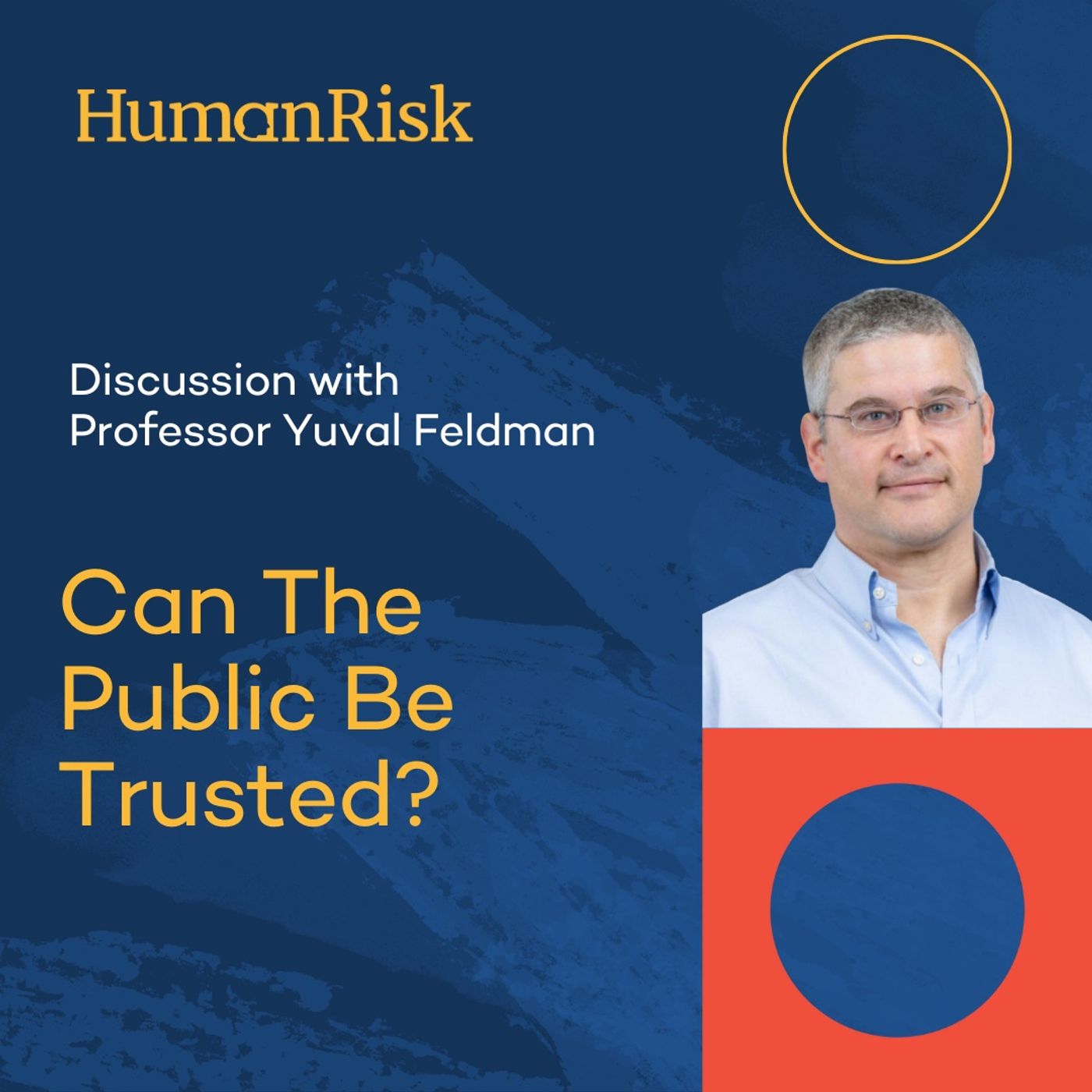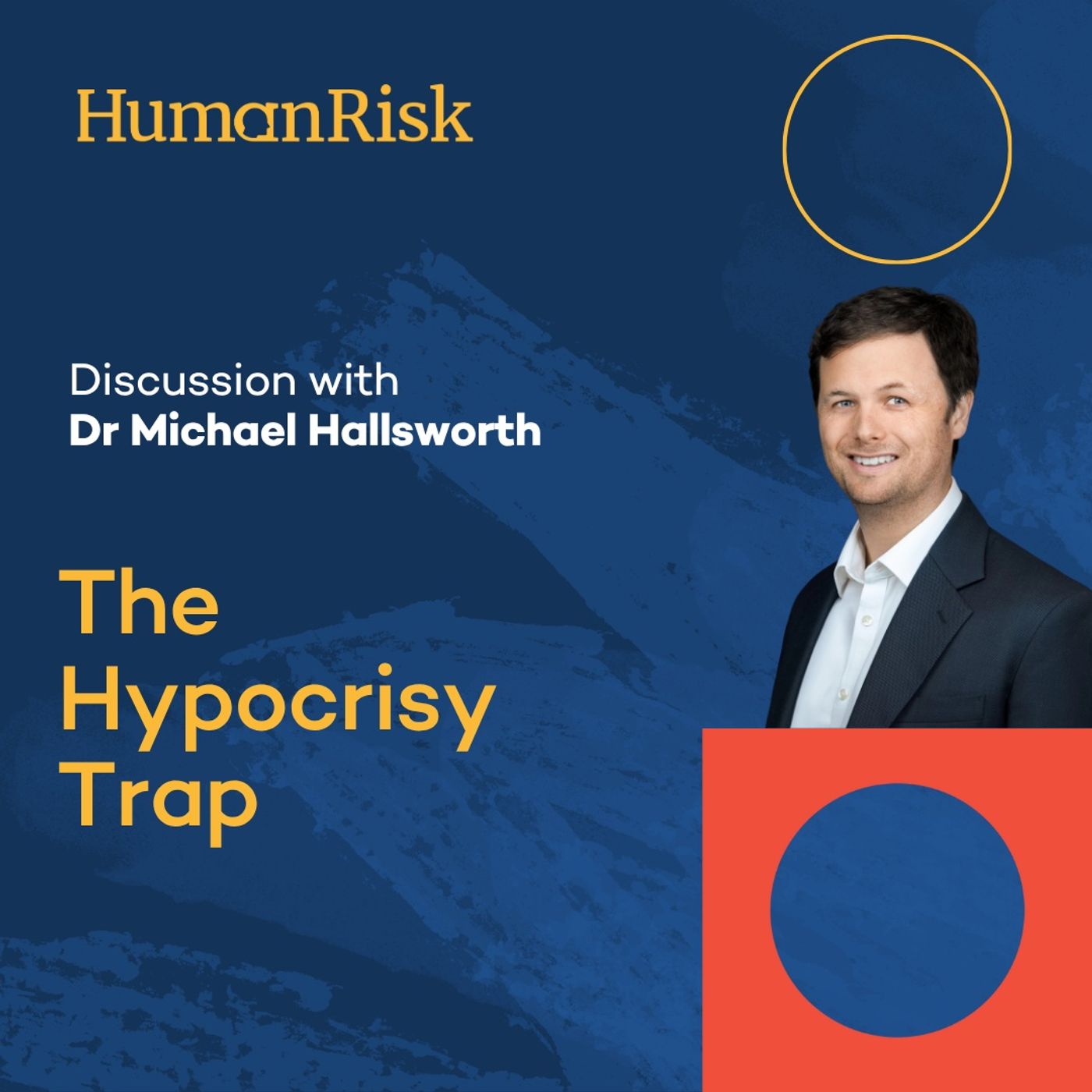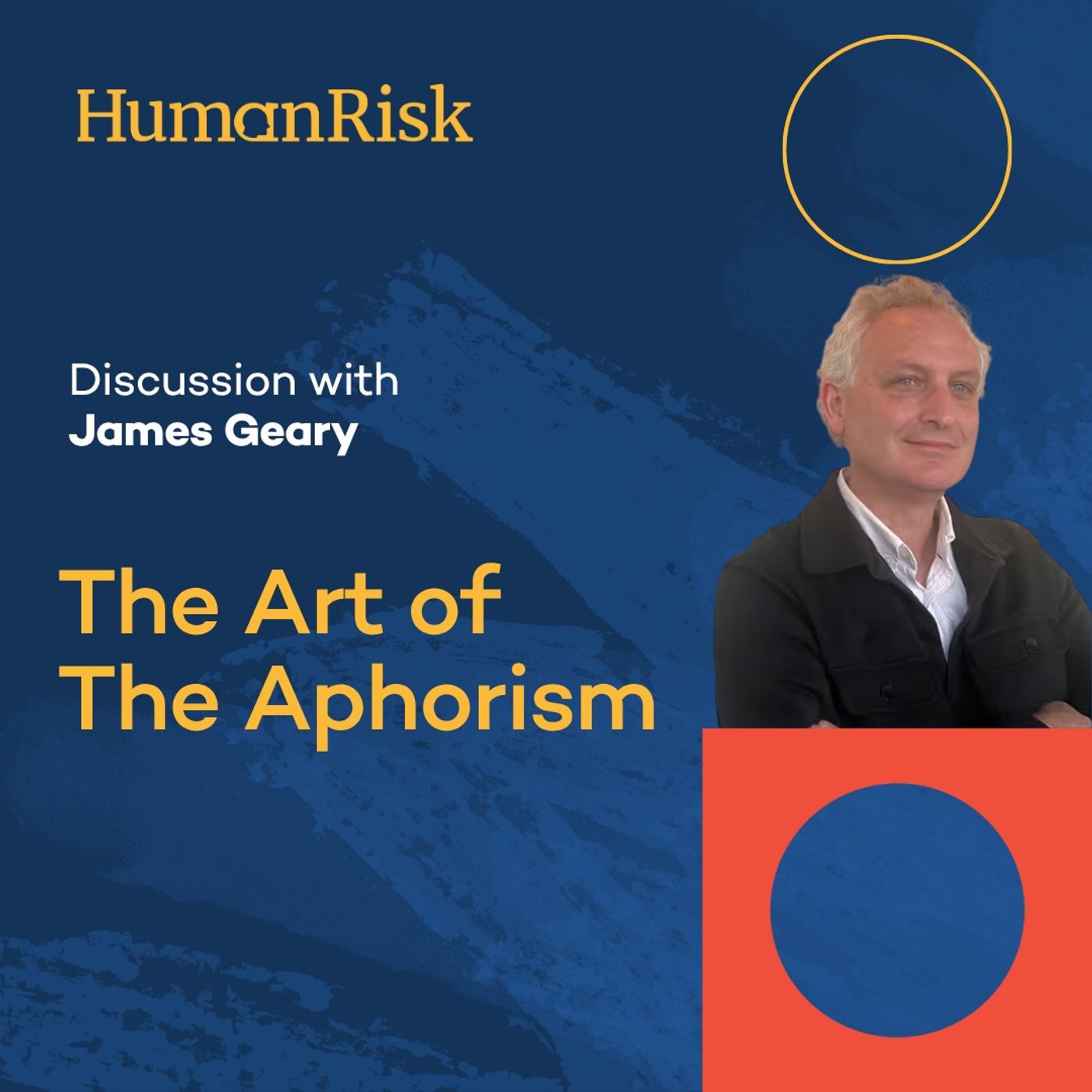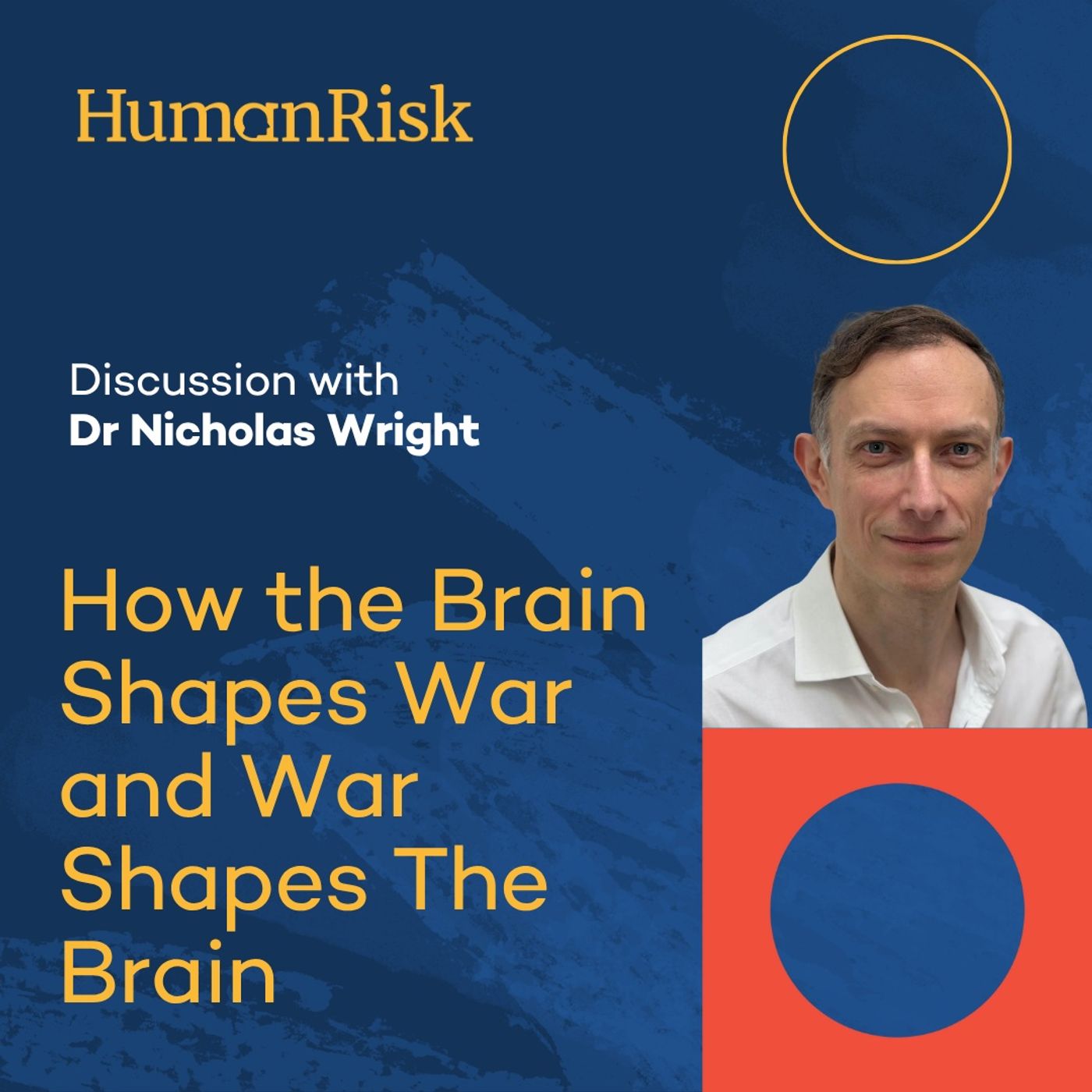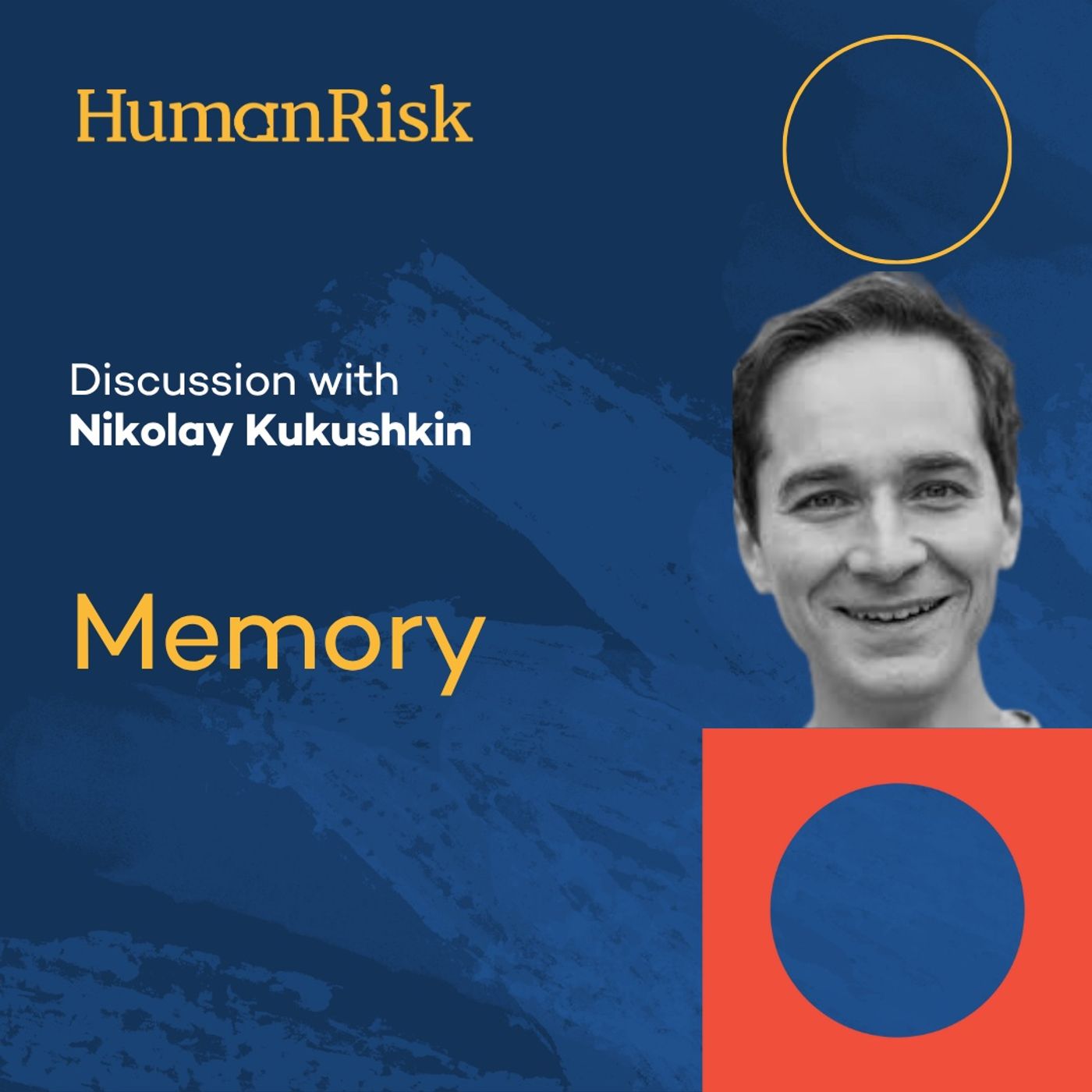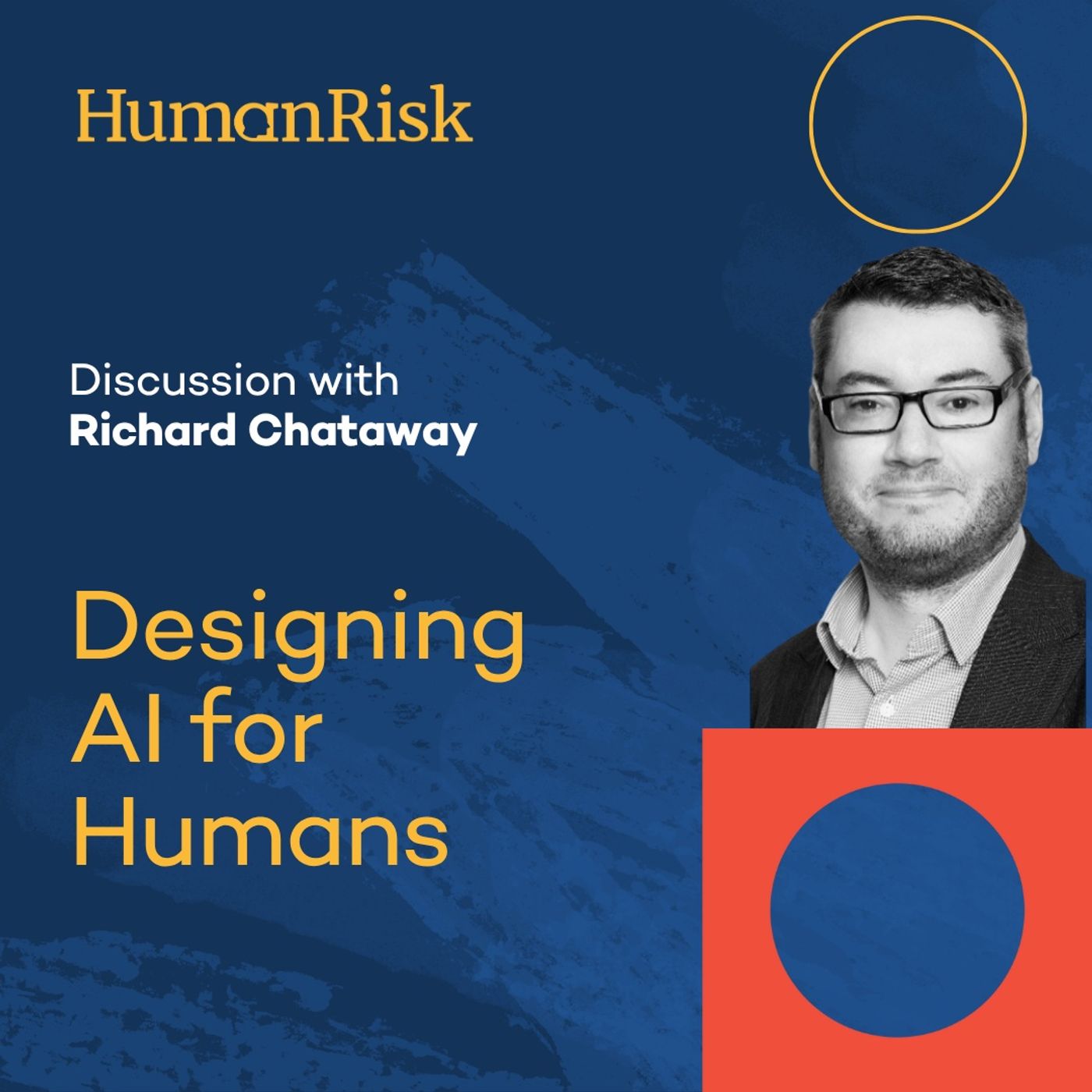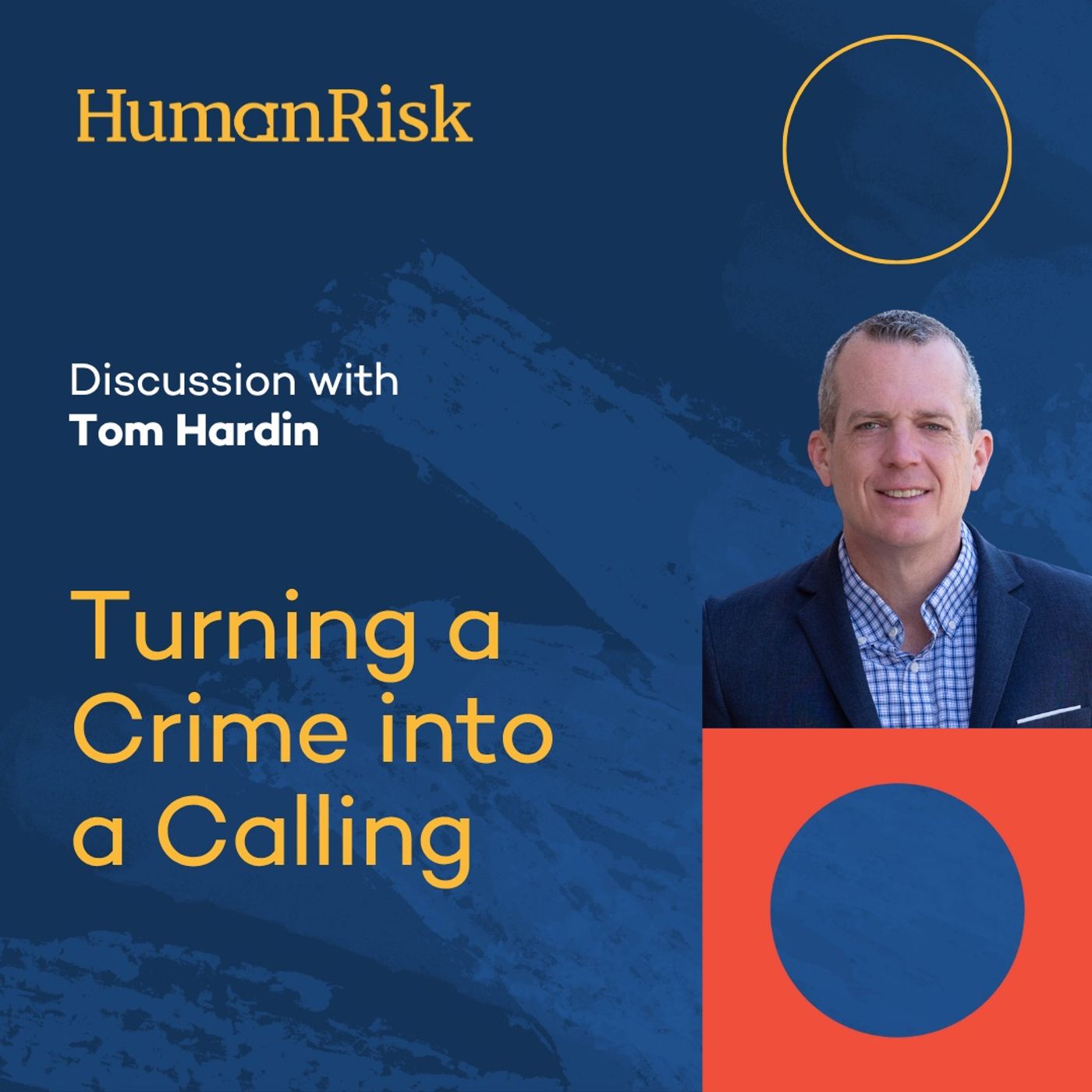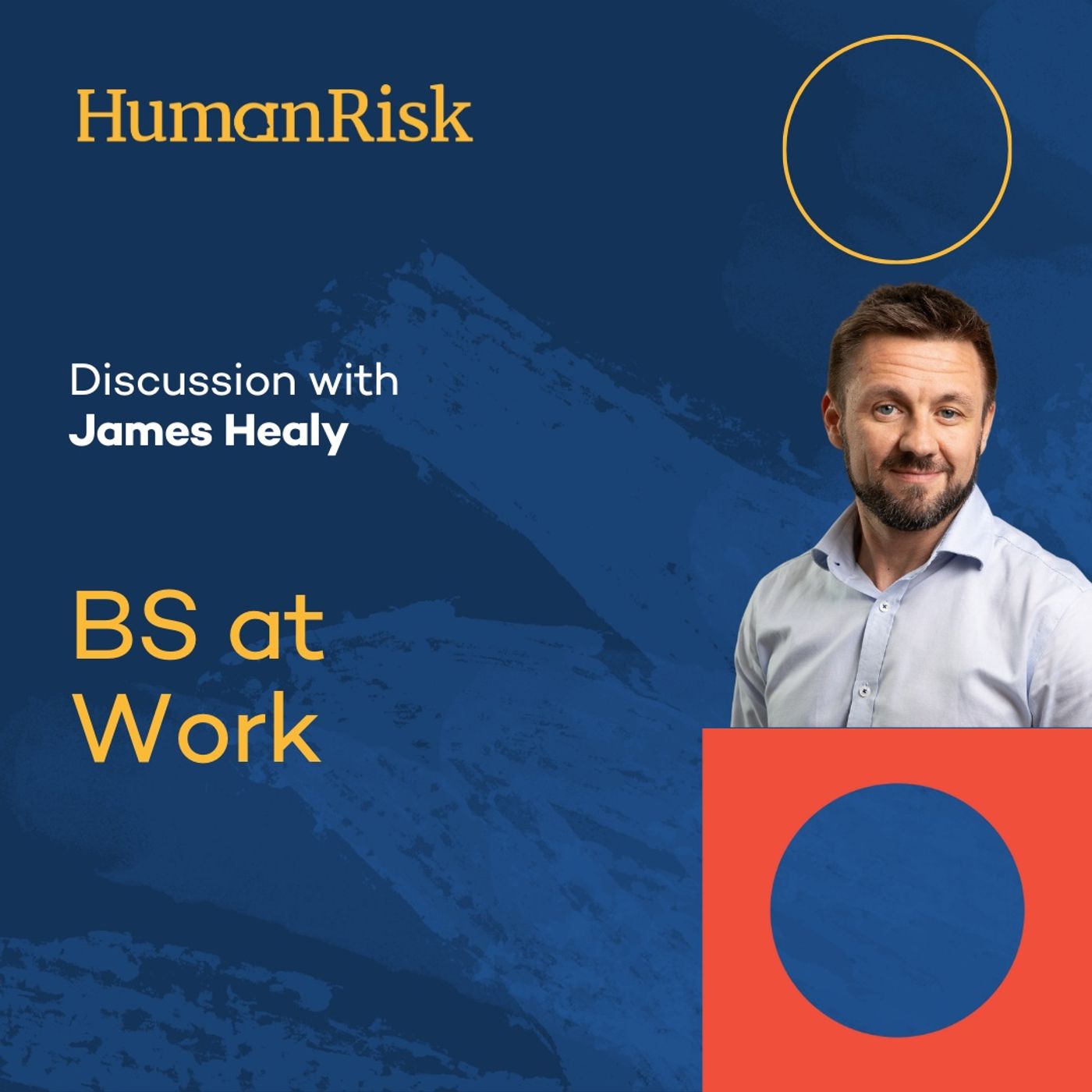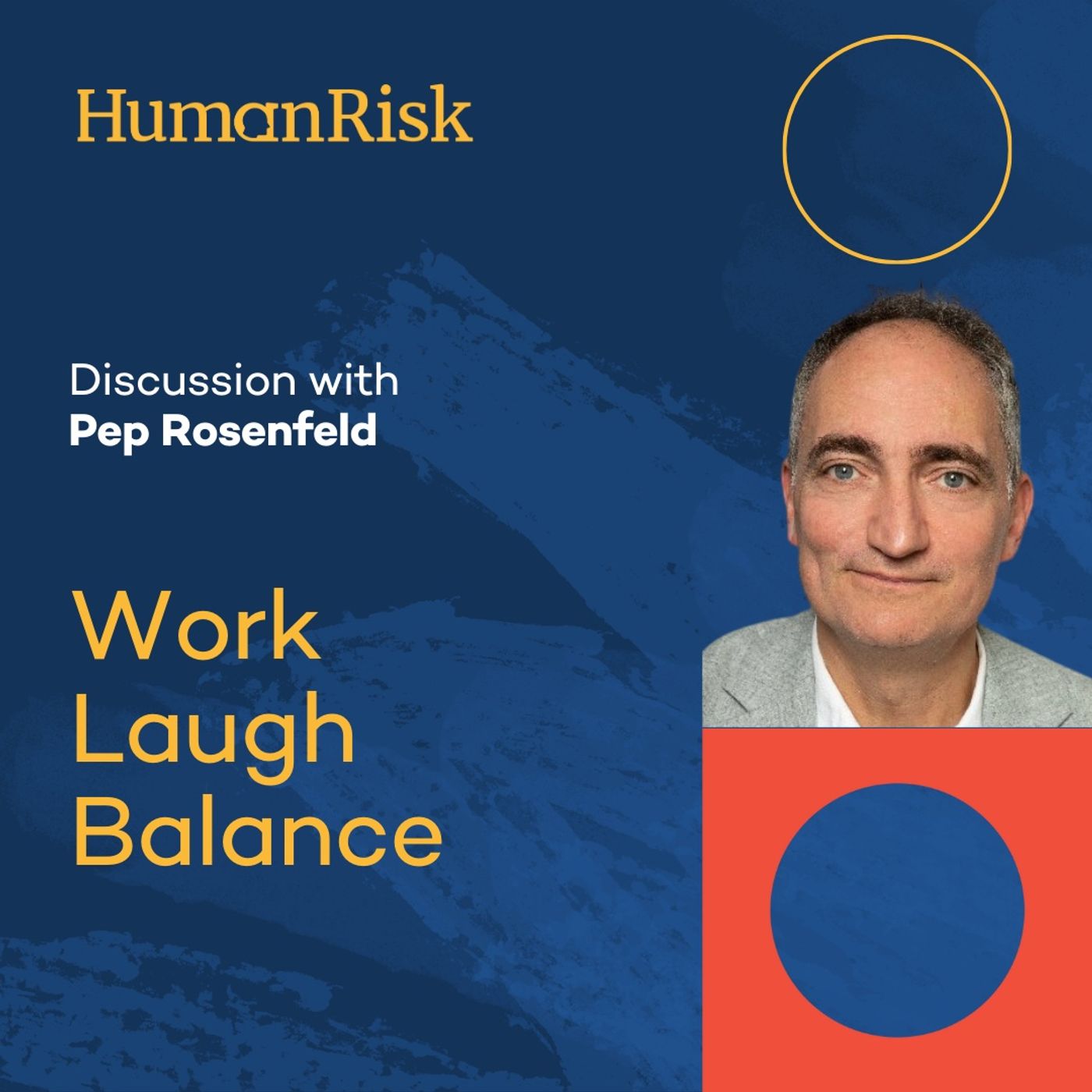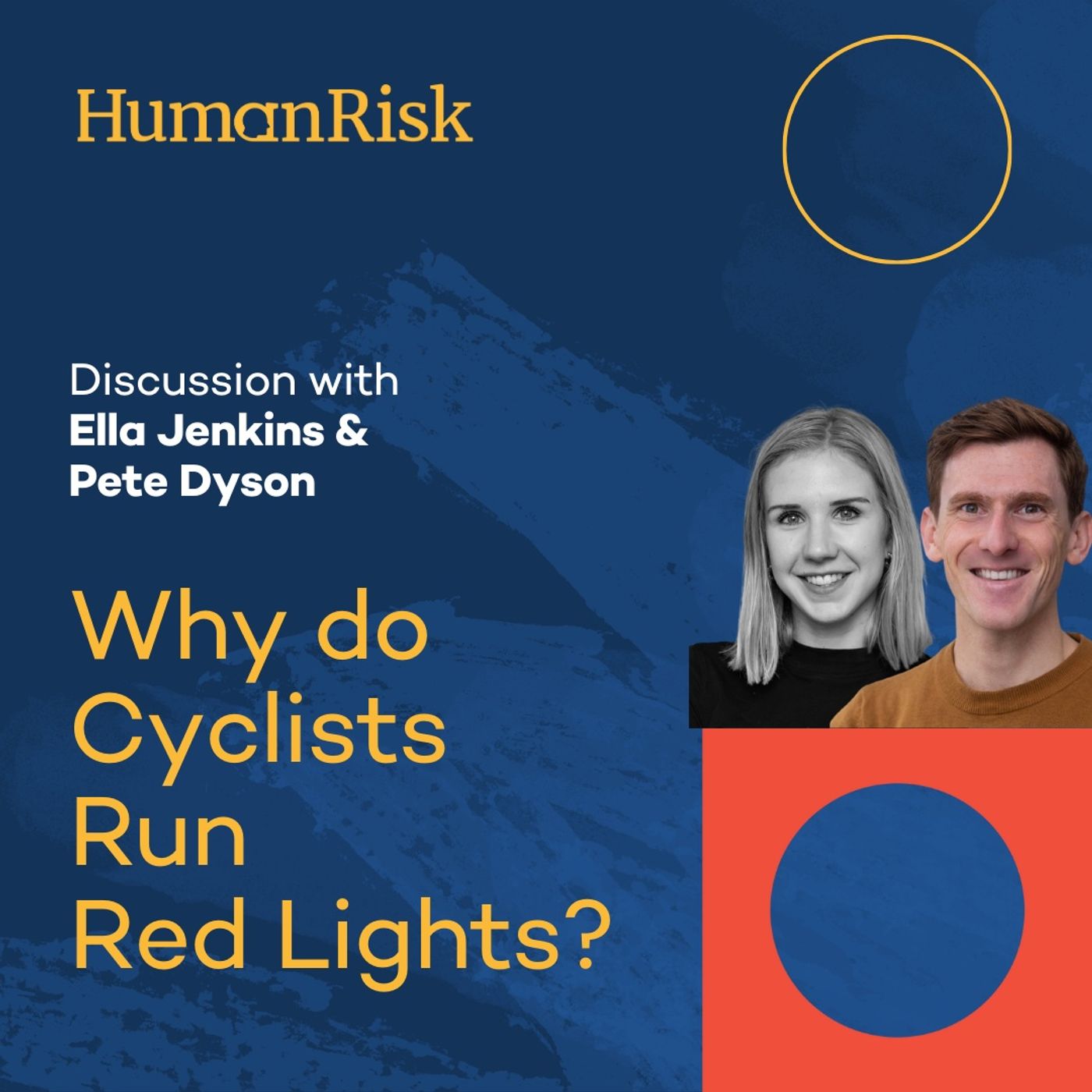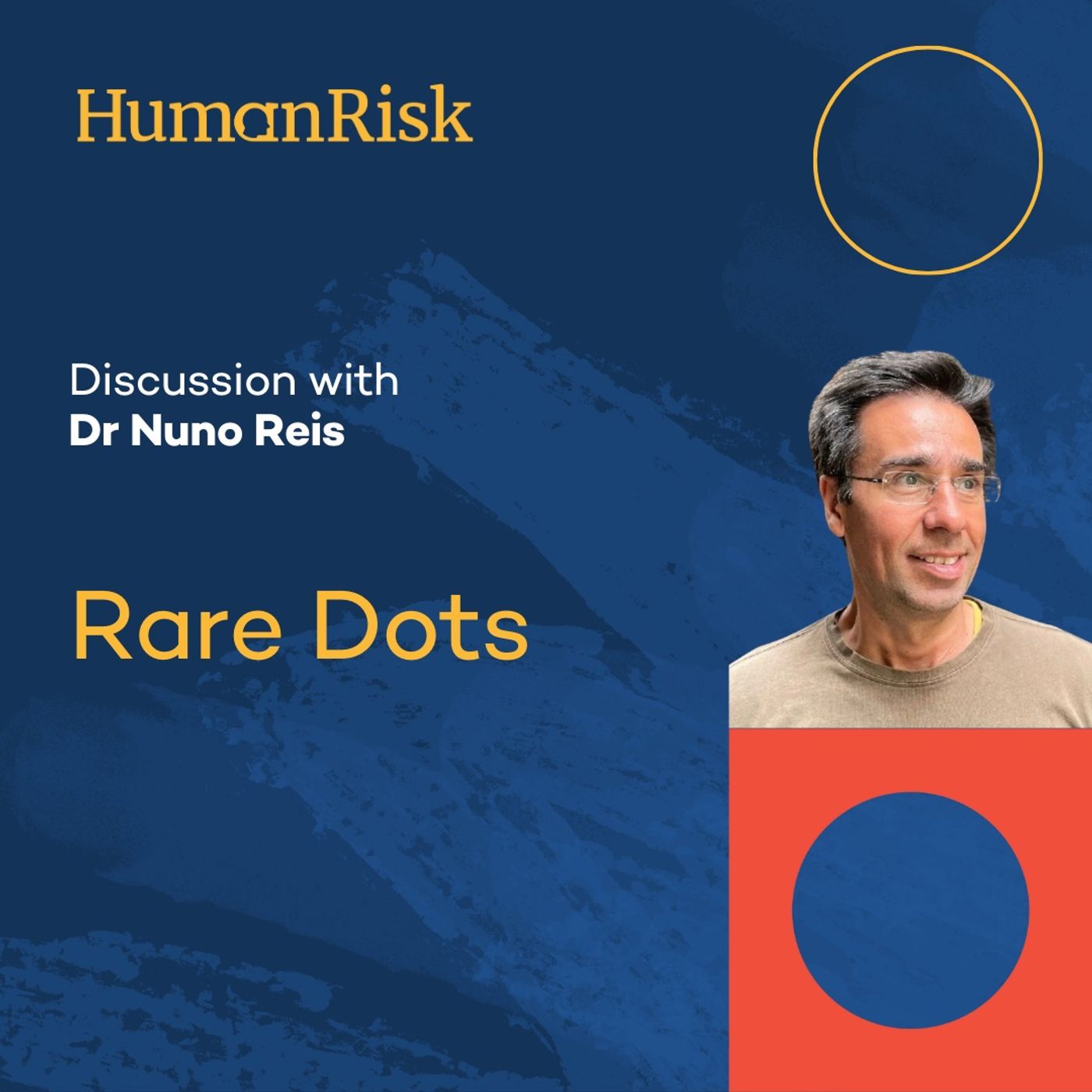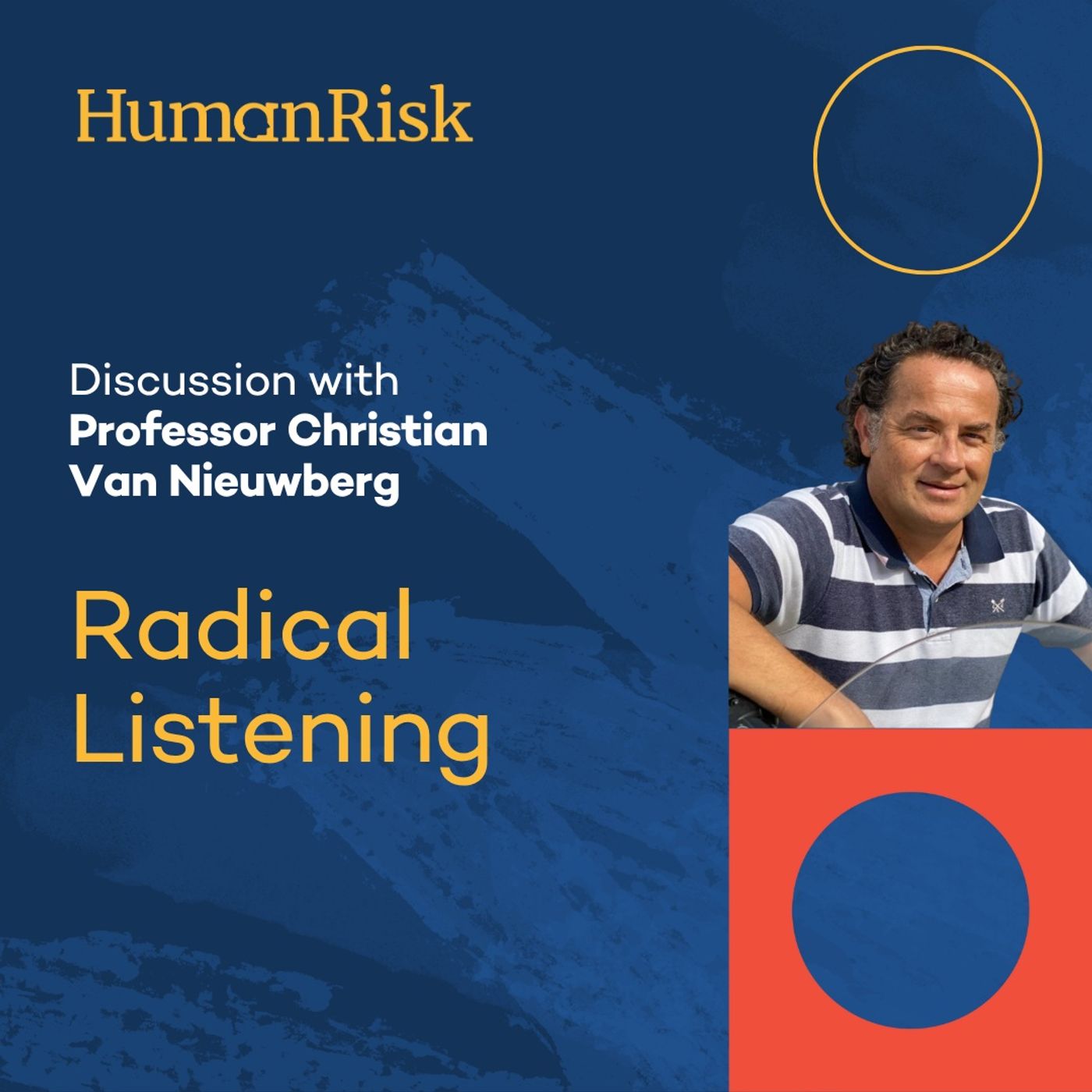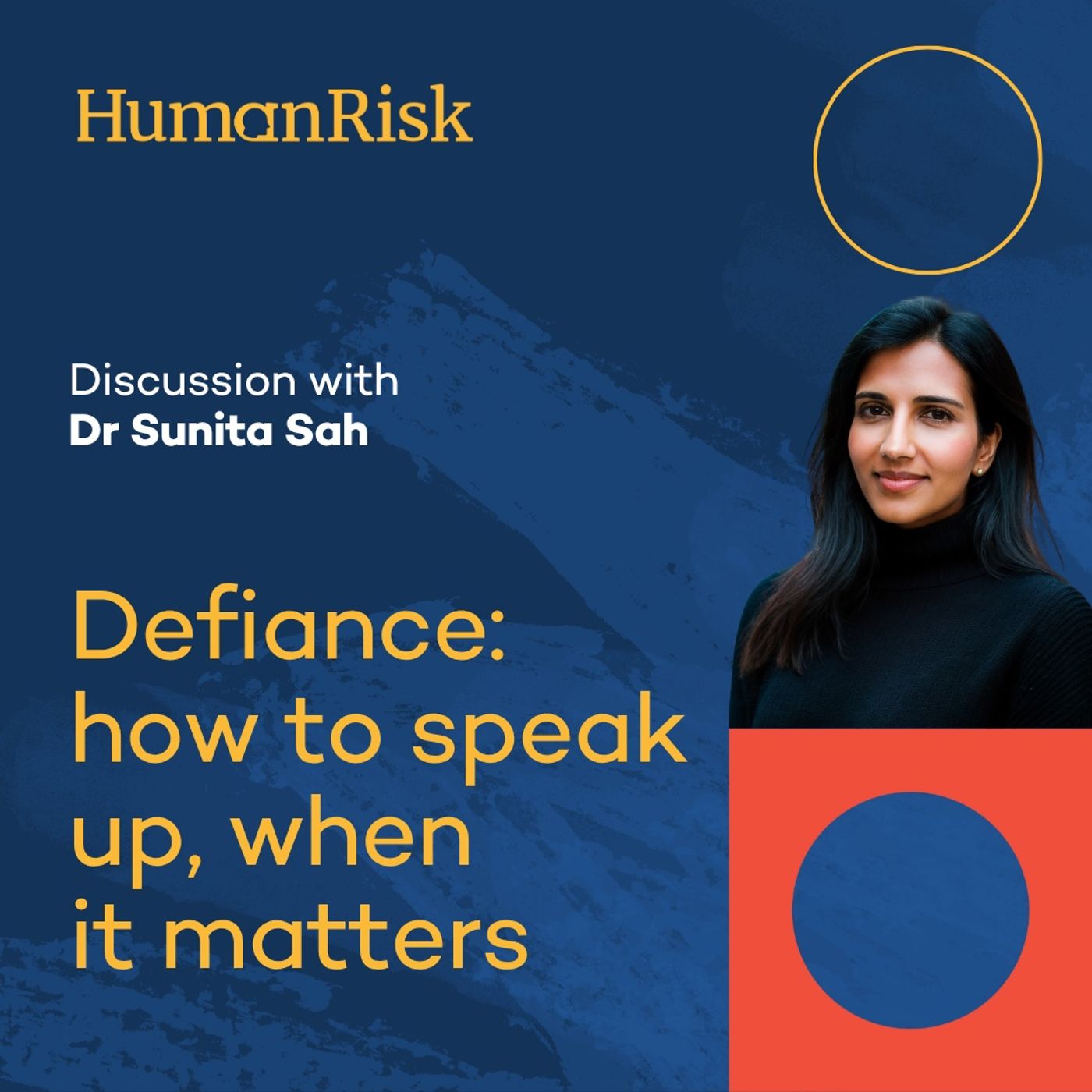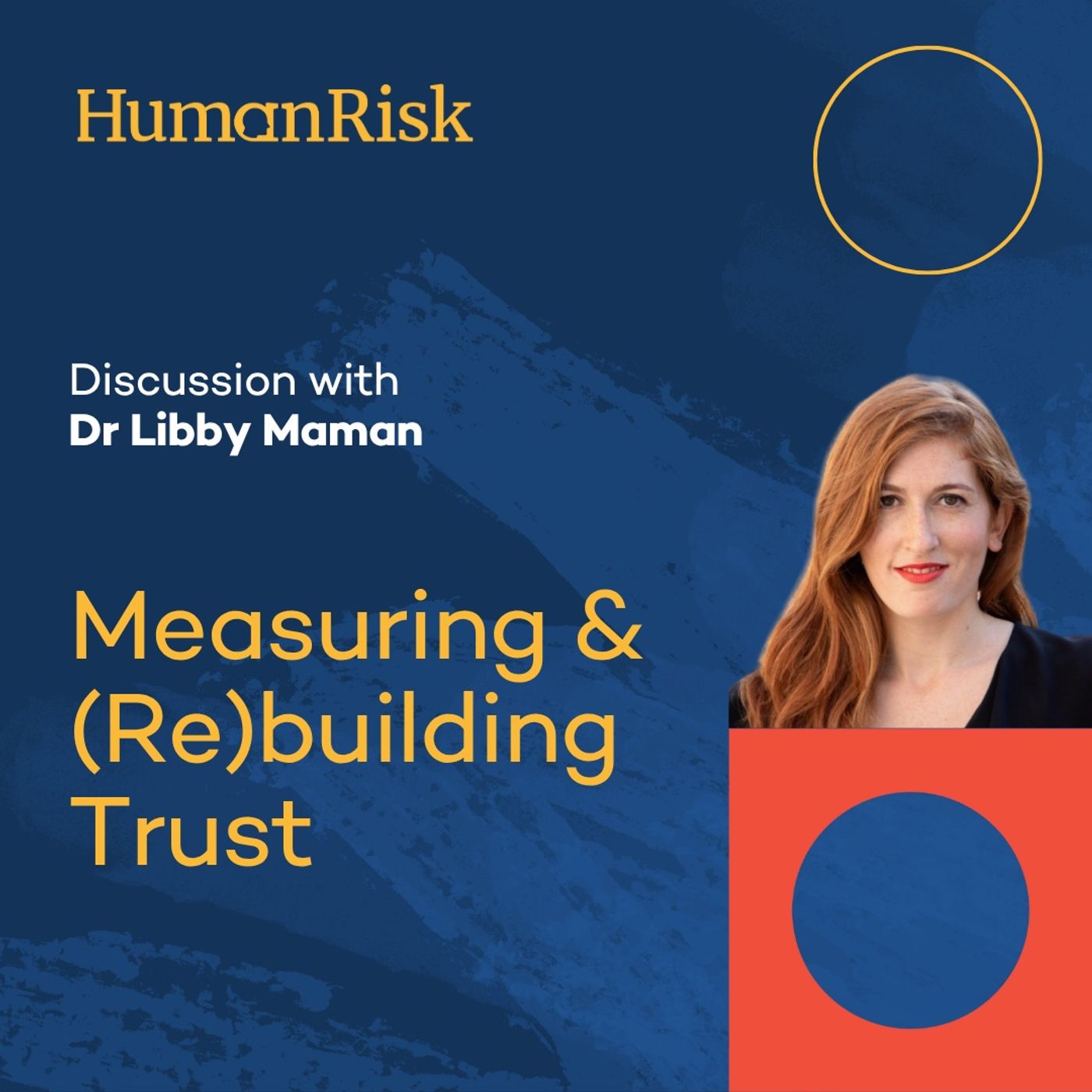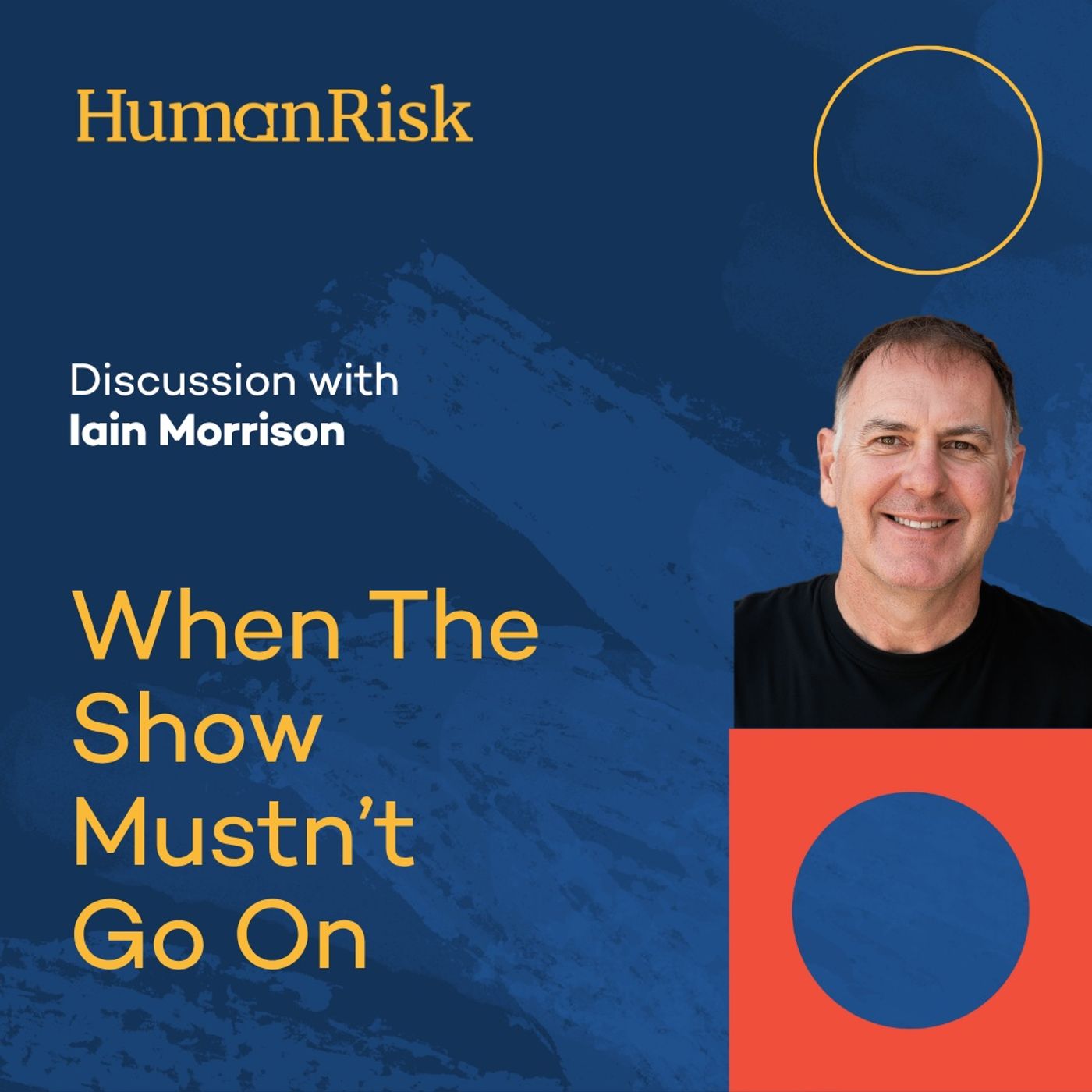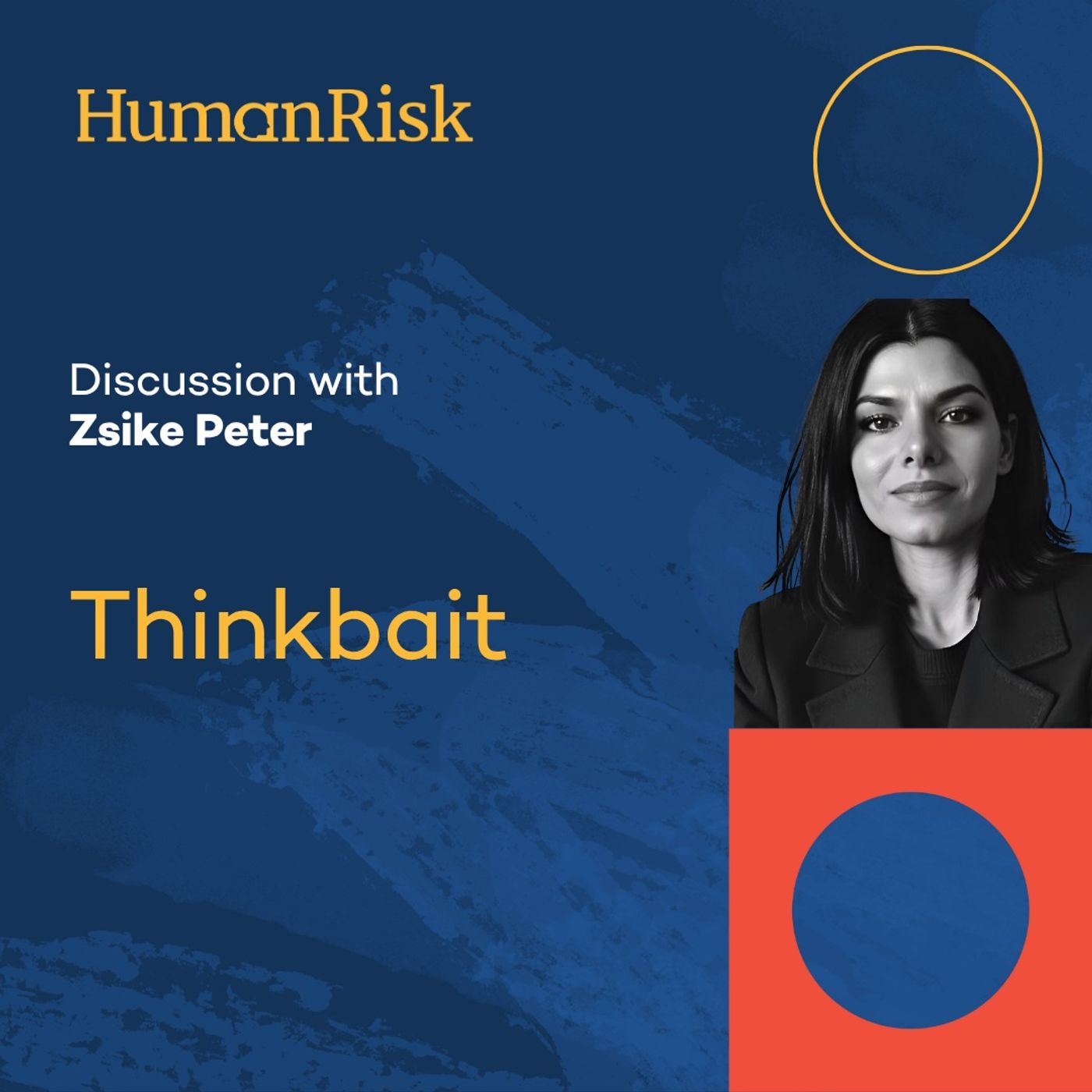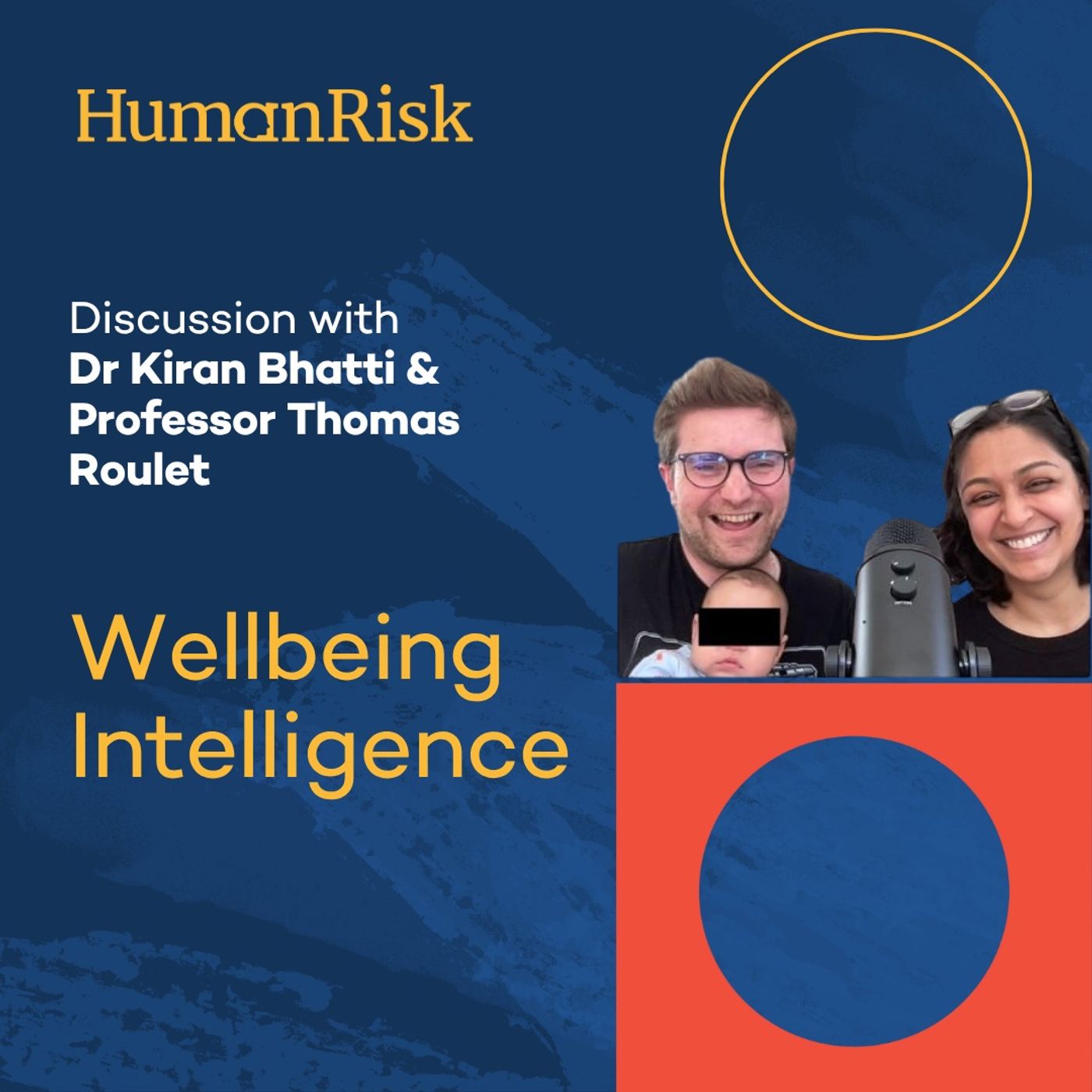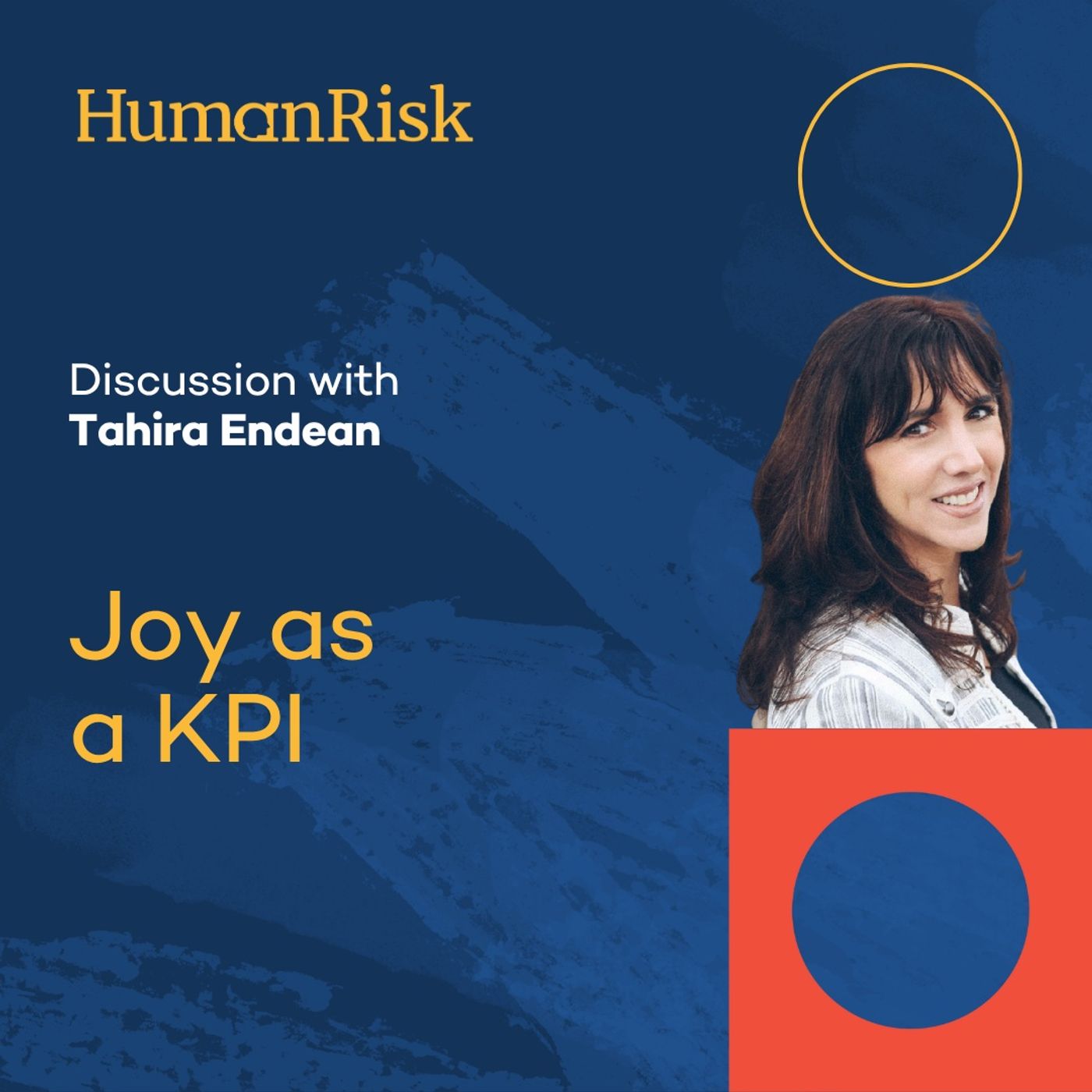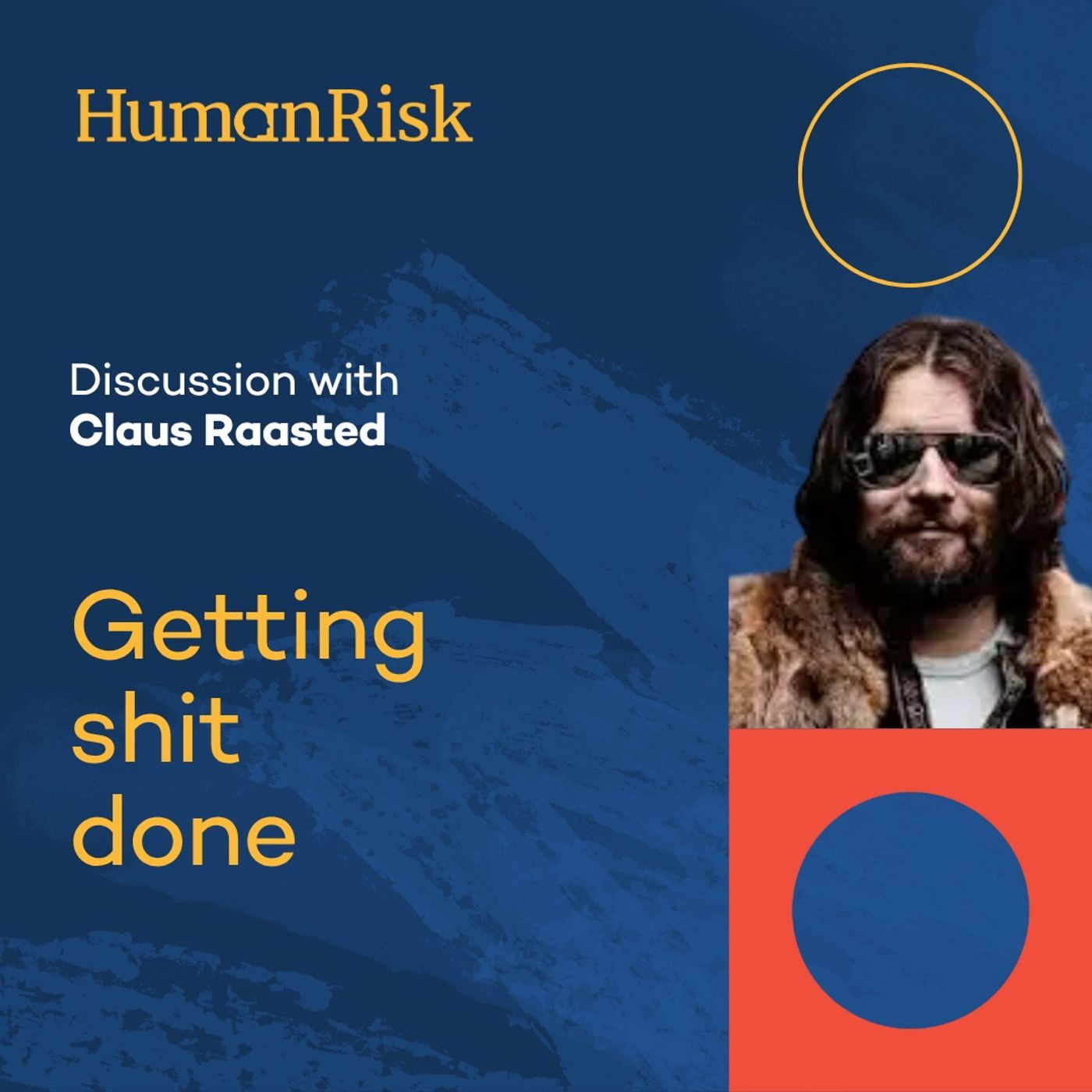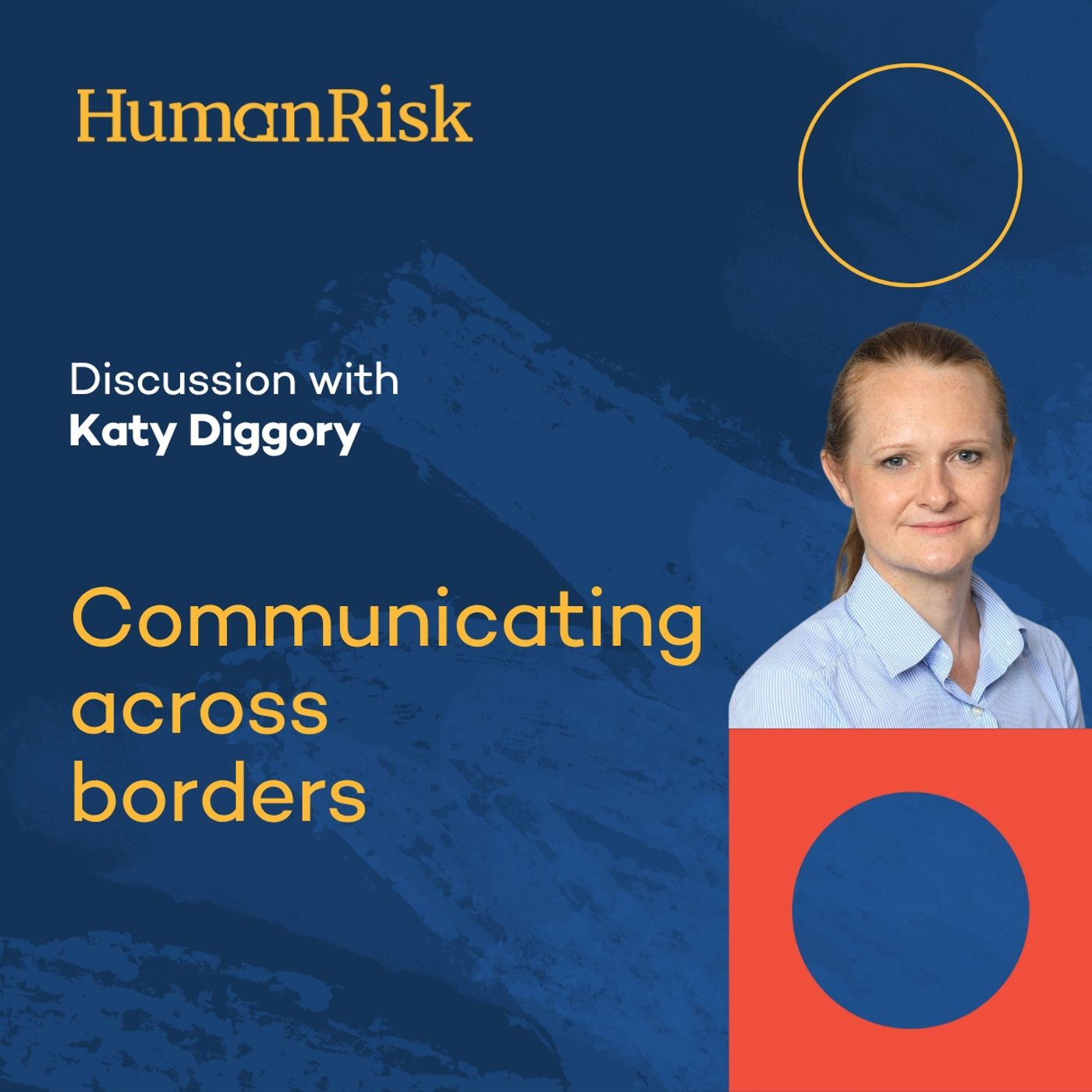Discover The Human Risk Podcast
The Human Risk Podcast

The Human Risk Podcast
Author: Human Risk
Subscribed: 106Played: 5,316Subscribe
Share
© Copyright Human Risk
Description
People are often described as the largest asset in most organisations. They are also the biggest single cause of risk. This podcast explores the topic of 'human risk', or "the risk of people doing things they shouldn't or not doing things they should", and examines how behavioural science can help us mitigate it. It also looks at 'human reward', or "how to get the most out of people". When we manage human risk, we often stifle human reward. Equally, when we unleash human reward, we often inadvertently increase human risk.
To pitch guests please email guest@humanriskpodcast.com
To pitch guests please email guest@humanriskpodcast.com
353 Episodes
Reverse
Why do governments rely on coercion and punishment when voluntary cooperation often produces better, more sustainable outcomes?Episode SummaryOn this episode, I’m joined once again by Professor Yuval Feldman, who returns to explore the core question behind his latest book: Can The Public Be Trusted? Instead of asking how much we trust our governments, Yuval flips the script, asking how much governments trust us, and whether that trust is deserved. Together, we dive into the concept of voluntary compliance, where people follow rules not because they’re forced to, but because they believe in doing the right thing. We unpack the complexity of this idea through real-world examples, from tax compliance to environmental policy to COVID-19 interventions. Yuval explains why people who think they’re ethical can actually be the hardest to regulate, and how misplaced trust can lead to serious regulatory blind spots. We also explore the psychological tension between intrinsic motivation and external enforcement, and why regulators often default to command-and-control, even when trust might offer a better solution. As ever, Yuval makes nuanced, sophisticated ideas feel accessible and immediately relevant. You'll hear about the role of culture, the limits of nudging, why economists might (sometimes!) actually be right about human behaviour and how AI might help policymakers make better decisions. Guest BioProfessor Yuval Feldman is a legal scholar and behavioural scientist at Bar-Ilan University in Israel. A returning guest and the podcast’s very first interviewee, Yuval is internationally renowned for his work at the intersection of law, psychology, and behavioural economics. His new book, Can The Public Be Trusted? The Promise and Perils of Voluntary Compliance is available open-access via Cambridge University Press (link below).AI-Generated Timestamped Summary[00:00:00] Introduction: why this question of “can the public be trusted?” matters for regulation and risk[00:03:42] Yuval’s personal background: how he came into law + psychology and the origin of his VComp lab[00:09:15] Defining voluntary compliance: what it means, how it differs from coercion[00:14:52] Intrinsic motivation vs crowding out: when good intentions are undermined by heavy‑handed regulation[00:21:30] Designing regulatory systems for trust: frameworks and features that support voluntary compliance[00:27:47] Case study: Covid‑19 and public cooperation—what we learned about trust, compliance and enforcement[00:34:10] Tax compliance as a trust test: how citizens respond when they believe the system treats them fairly[00:39:58] Environmental regulation and the limits of voluntary strategies: when culture or technology create barriers[00:45:22] Cross‑cultural & technological dynamics: how digital reputation, culture and platforms impact compliance[00:50:05] The perils of voluntary compliance: when trust can be misplaced, manipulated or simply ineffective[00:55:30] Final reflections: what this means for risk professionals, policymakers and anyone designing systems of human behaviour[01:00:12] Closing: how to reframe regulation to see the public not as a risk but as a resource.LinksYuval's academic profile - https://law.biu.ac.il/en/feldmanHis profile on LinkedIn - https://www.linkedin.com/in/yuval-feldman-21942514/ His open-access book Can the Public Be Trusted? (Cambridge University Press) – https://www.cambridge.org/core/books/can-the-public-be-trusted/B3E11831E3051D4E928B9252B6767A4BYuval’s previous appearances on the show On The Law of Good People or ‘why we should write rules for good people not bad people’ (2019) - https://www.humanriskpodcast.com/professor-yuval-feldman-on-why/ On Trust & Voluntary Compliance (2022) - https://www.humanriskpodcast.com/professor-yuval-feldman-on-trust-compliance?
We all intuitively know that hypocrisy is a bad thing. But what if it isn’t a flaw, but a feature? But maybe the real problem isn’t hypocrisy, it’s how we think about it.Episode SummaryOn this episode, I'm talking to Dr Michael Hallsworth, a leading behavioural scientist and the author of The Hypocrisy Trap. We explore a topic that’s instantly recognisable but not often properly understood. Hypocrisy is something we’re quick to spot in others, slow to acknowledge in ourselves, and often design around as if it were avoidable or inherently wrong. What Michael reveals — through personal stories, behavioural experiments, and a careful unpacking of what hypocrisy really means — is that our judgments of hypocrisy say more about us than about the people we’re criticising. In fact, hypocrisy isn’t just common; it’s structurally baked into how we navigate competing priorities, conflicting values and real-world trade-offs. And sometimes, paradoxically, a little hypocrisy might even be useful.That makes it incredibly relevant to human risk. In compliance, ethics, and organisational culture, we tend to assume people should act consistently with what they believe, and we often penalise them when they don’t. But as Michael explains, this assumption can lead us to build systems that are brittle, punitive or out of touch with how people actually behave. This conversation challenges that frame and offers a more human — and more effective — way of thinking about inconsistency, trust and moral judgment.Guest Biography - Michael HallsworthDr Michael Hallsworth is Chief Behavioural Scientist at the Behavioural Insights Team (BIT), where he applies behavioural science to policy, organisational design and real‑world behavioural change. He describes himself as someone “helping people apply behavioural science to real‑world problems” and is the author of The Hypocrisy Trap: How Changing What We Criticise Can Improve Our Lives.At BIT, Michael has led numerous projects spanning government and private sector domains, bridging rigorous academic research with operational behavioural insight. His work is characterised by practical translation of behavioural science and an upfront acknowledgement of human complexity — the grey zones rather than the simple binaries.His new book brings this lens to the topic of hypocrisy, exploring how our judgments of double standards shape behaviour, institutions and trust in counter‑intuitive ways.AI-Generated Timestamp Summary[00:00:00] Intro and framing of hypocrisy as a human behavioural risk[00:01:00] Why hypocrisy runs deeper than just “saying one thing and doing another”[00:02:00] Discussion of how organisations treat moral consistency — and the limitations of that approach[00:03:00] Michael’s background, BIT and the genesis of his book[00:04:00] Defining hypocrisy: the three‑part structure[00:06:00] The two‑fold meaning: false image vs double standards[00:07:00] Michael’s personal story with his daughter + the context of “PartyGate”[00:09:00] Historical roots: Freud’s view on civilisation and hypocrisy[00:11:00] Why hypocrisy is a social judgement rather than purely behavioural[00:13:00] When calling out hypocrisy becomes counterproductive in change efforts[00:15:00] Real‑world examples: politics, business, everyday life[00:17:00] The phenomenon of ‘do‑gooder derogation’ and why consistent people make us uneasy[00:20:00] Hypocrisy as a strategic accusation in social media and organisational life[00:22:00] The behavioural science of induced hypocrisy and what it tells us about change[00:25:00] Honest vs. relatable hypocrisy: shifting the narrative[00:28:00] Michael outlines three categories for navigating hypocrisy[00:30:00] His reflections on writing the book and the surprises he uncovered[00:34:00] Balancing moral integrity with public perception and stakeholder expectations[00:36:00] Hypocrisy in corporate ESG: the tension between expectation and action[00:39:00] Managing contradictions among stakeholders: the inevitable trade‑offs[00:41:00] Experiment results: private hypocrisy and moral judge[00:44:00] The paradox: why we prefer people who are ‘inconsistent but principled’ over ‘consistent and bland’[00:46:00] Authenticity vs inauthentic leadership — and the hypocrisy dimension[00:48:00] Is this a practical manual for “how to do hypocrisy well”?[00:51:00] Final reflections: hypocrisy isn’t always about morality—sometimes it’s about signalling, trust and change[00:54:00] Michael’s hope for what the book can achieve and closing thoughts[00:57:00] Wrap‑up, thanks and behavioural nudge for the listenerLinksMichael's website - https://www.michaelhallsworth.com/The Hypocrisy Trap – https://www.thehypocrisytrap.com/Behavioural Insights Team - https://www.bi.team/Michael's IT profile – https://www.bi.team/people/michael-hallsworth/'Partygate' explainer - https://www.bbc.co.uk/news/uk-politics-59952395
Can a single sentence change the way you see the world? My guest on this episode, James Geary thinks so.Episode SummaryOn this episode, I speak with writer and journalist James, whose lifelong fascination with aphorisms — the world’s shortest literary form — reveals why brevity really is the soul of wit. James explains what makes an aphorism work, shares the five laws that define them, and explores how these concise little sayings have guided human thought from ancient times to social media. We discuss:The difference between aphorisms and proverbsHow short phrases can serve as decision-making tools and emotional signpostsWhy humour and contradiction are central to wisdomHow modern culture, marketing, and even AI continue the aphoristic traditionJames’s book The World in a Phrase and why he chose to update it 20 years after originally publishing itI also ask him whether my friend James Victore's phrase 'what made you weird as a kid, makes you great today' is an aphorism (spoiler alert: it is!).Guest bioJames Geary is a writer, journalist, and Deputy Curator at Harvard’s Nieman Foundation for Journalism. He is the author of 'The World in a Phrase: A Brief History of the Aphorism' and 'Geary’s Guide to the World’s Great Aphorists'.Links to topics James' book The World in a Phrase: A Brief History of the Aphorism (Second Edition) — University of Chicago Press page. University of Chicago PressJames' official website (book + aphorism archive). jamesgeary.com+1Harvard Gazette profile piece (“Brief bursts of wisdom”). Harvard GazetteJames Geary — TED Talk “Metaphorically speaking.” TEDEarlier Human Risk podcast episode with James Victore (where he shares “the things that made you weird…”): The Human Risk PodcastAI-Generated Timestamp Summary[00:00:00] Opening, why short phrases stick; introducing James Geary and my confession about “aphorism” pronunciation and definition.[00:01:00] What aphorisms are; oldest literary form; Reader’s Digest spark at age eight. [00:03:00] First memorable line: “difference between a rut and a grave”; why compressing meaning captivated him. [00:05:00] The five laws: brief, personal, definitive, philosophical, with a twist; applying them to the Victore quote. [00:06:30] Truth vs. usefulness; contradictions (Johnson vs. Bierce) and situational wisdom. [00:08:45] Aphorisms as everyday philosophy; “signposts” and “violin in public” imagery. [00:10:45] Teenage collecting; writing aphorisms on the backs of rock posters. [00:12:45] Joy + darkness; why humour helps memory; “Why can angels fly? Because they take themselves lightly.” [00:16:30] Family sayings; “If you’re not living on the edge, you’re taking up too much space.” [00:17:45] Redundancy story; “treacherous ground” aphorism as psychological footing. [00:19:30] Secular scripture; Pascal’s tennis metaphor; timelessness across traditions. [00:23:00] Originality vs. recurrence; why the twist makes the familiar new. [00:25:15] Beyond greeting-card obviousness; Emerson’s “braver five minutes longer.” [00:27:45] Knowing when to persist vs. bail; relationship aphorism “don’t let someone show you twice.” [00:31:00] Short form ≠ short attention; links to deep, long thinking. [00:33:30] Craft vs. hot takes; how aphorisms provoke contemplation and dialogue. [00:37:00] Ukraine example; “We kneel before heroes, not invaders” and words+images. [00:41:00] Free speech, calm strength, and the form’s defiance of authoritarianism. [00:43:15] Why a history, not a favourites list; posters to book structure. [00:47:00] Rights reversion; why a new edition now; social media context; more aphorists. [00:49:15] Choosing figures: omitting Wilde; championing Stanisław Lec; “No snowflake in an avalanche ever feels responsible.” [00:53:00] Aphorisms everywhere: t-shirts, bumper stickers, ads; “Lick the lid of life.” [00:56:30] Can AI write aphorisms? Yes — but beware “cognitive laziness.” [01:01:00] Prompts for humans vs. prompts for machines; why discomfort matters. [01:02:15] Book details; publisher; where to find it; closing thanks. [01:04:00] Outro: links, review ask, website, and final behavioural nudge on “phrases you live by.”
What can war teach us about how the human brain really works? And why is human decision-making a more significant factor than military strength in wars?Episode SummaryOn this episode, I'm exploring how the human brain truly manifests in conflict—and what that reveals about everyday decision-making. Dr Nicholas Wright, a neurologist-turned-neuroscientist who advises the Pentagon Joint Staff, joins me to discuss his new book Warhead: How the Brain Shapes War and War Shapes the Brain. In our conversation, Nick explains why fear is functional, how “will to fight” can outweigh superior force, and why democracies remain capable of catastrophic decisions. He also explains how perception operates as a controlled hallucination anchored to reality rather than a simple sensory feed, and why that distinction matters for strategy, leadership, and risk. Moving from fruit flies to front lines, Nick shows how simple neural chemicals regulate aggression, how the brain’s grid cells create literal maps to navigate danger and opportunity, and how both biological and organisational models can mislead when mistaken for reality. The discussion ranges from 1940 France to Kyiv, from Stalingrad to Gaza, and from deception as a vice to deception as a civic virtue.Nick makes a compelling case for metacognition — the ability to think about one’s own thinking— as the conductor of the brain’s internal orchestra and argues that wisdom—not merely cleverness — must be deliberately designed into leaders and into the next generation of artificial intelligence.We end with practical insights: cultivating “better ignorance,” inviting real dissent in the spirit of Churchill, and creating deliberate spaces for reflection like (I'm delighted to report) long train journeys.Guest Biography Dr Nicholas Wright, MRCP, PhD, is a neuroscientist researching the intersections of the brain, technology, and security at University College London, Georgetown University, and the Center for Strategic & International Studies in Washington, DC. He also serves as an adviser to the Pentagon Joint Staff. Beyond academia, Wright leads projects connecting neuroscience, artificial intelligence, and strategy, and has advised the Pentagon Joint Staff for more than a decade.He consults on AI for SAP and edited Artificial Intelligence, China, Russia, and the Global Order (Air University Press, 2019).His latest book, Warhead: How the Brain Shapes War and War Shapes the Brain, is published by St. Martin’s Press (US) and Pan Macmillan (UK).AI_Generated Time-stamped Summary[00:00:00] Introduction [00:01:00] Nick Wright’s journey from neurologist to defense advisor, applying neuroscience to strategy and AI.[00:04:29] How evolution shaped the human brain for survival and combat — we’re “built to win or survive a fight.”[00:05:59] Fear as a vital yet double-edged emotion; anxiety as a side effect of peace.[00:08:26] Origins of the book Warhead and cultural perceptions of its title.[00:09:39] Why war remains relevant; critique of overconfidence in peace and Pinker’s “Better Angels” thesis.[00:12:01] Lessons from France’s WWII defeat — cognition and morale outweigh material strength.[00:14:41] Ukraine’s resistance as an example of will to fight; psychology as a decisive factor.[00:15:42] Creativity and emotion as essential tools in decision-making; the brain as an orchestra balancing logic and instinct.[00:18:10] What fruit flies reveal about aggression and shared neural circuitry with humans.[00:21:13] Structure of Warhead — using neuroscience to reinterpret history and warfare.[00:26:37] Mental models and how the brain simulates reality to guide choices.[00:30:37] Perception vs. reality — the brain generates, not records, the world we see.[00:35:31] The “uncanny valley” and prediction errors — why imperfect mimicry unsettles us.[00:36:17] Moral symmetry in conflict — both sides perceive their cause as just.[00:38:00] Deception and fog of war — manipulating human perception as a timeless weapon.[00:41:00] WWII story of René Carmille — lying as moral resistance.[00:43:59] Social media, attention, and the loss of reflection — the modern “disease of abundance.”[00:45:41] Wisdom versus cleverness — Churchill’s reflective habits and valuing dissent.[00:48:11] “Better ignorance” and intellectual humility as foundations of wise leadership.[00:51:26] Cognitive diversity, AI, and the need to embed wisdom—not just intelligence—into machines.[00:58:28] From WWII to China today — the enduring need for wisdom in navigating global conflict.LinksNick's website - https://www.intelligentbiology.co.uk/WarHead Nick's book - https://www.intelligentbiology.co.uk/booksNick on LinkedIn - https://www.linkedin.com/in/nicholas-d-wright-bba3a065/If you liked this episode, you might also like my discussion with Dr Mike Martin - https://www.humanriskpodcast.com/dr-mike-martin-on-war-politics/
What if your body is learning things your mind doesn’t know? What if memory wasn't just something that our brain has?Episode Summary On this episode, I'm exploring a bold idea with neuroscientist Dr Nikolay Kukushkin: memory doesn’t just live in the brain. It might be a basic property of life itself. We unpack how scientists define memory (behavioural change over time) versus how the rest of us use the word, and why that distinction matters—from sea slugs to kidney cells. I ask the “muscle memory” question we all carry, and we separate the metaphor from the biology: your basal ganglia automate behaviours, but your muscle cells do literally adapt to patterned use.We go deep on “patterns.” Nikolay’s work shows that even non-neural cells can detect minute-scale timing differences—preferring spaced pulses over a single crammed dose. That has huge implications for learning, exercise, nutrition, and even medicine; it suggests timing might be as important as quantity. We also talk about sleep as essential “synaptic housekeeping,” why false memories are an adaptive feature (not a failure), and what it really means to “run out of memory” in our overstimulated world.Finally, we tilt at the big questions: how consciousness might have evolved, why Plato’s model of perception eerily echoes today’s top-down/bottom-up neuroscience, and what AI still lacks—learning patterns in time within an embodied world. If you’ve ever crammed for an exam, worried about forgetting your own name, or wondered what your cells are quietly learning from your daily routines, this one will rewire how you think about memory.Guest Biography — Dr Nikolay KukushkinDr Nikolay Kukushkin is a Clinical Associate Professor at NYU. His book One Hand Clapping: Unraveling the Mystery of the Human Mind traces how consciousness emerged from the natural world; the original Russian edition won the Enlightener (Prosvetitel) Award and the Alexander Belyaev Medal.His recent research (Nature Communications, Nov 2024) showed that non-neural human cells display the classic “spacing effect,” suggesting memory-like temporal patterning beyond the brain.AI-Generated Timestamped Summary [00:00:00] Cold open: reframing memory as cellular, not just neural. [00:01:00] Scientists’ definition of memory vs everyday usage. [00:03:00] From behaviour change to cellular change; beyond “plugging a muscle into a brain.” [00:05:00] All cells have experiences; “pattern matters.” [00:06:00] Muscle memory: basal ganglia automation vs literal muscle adaptation. [00:07:00] Shared molecular machinery: “use it or lose it” in brain and muscle. [00:08:00] Nikolay’s path: from molecules to minds; bottom-up neuroscience. [00:09:00] Protein quality control: molecular barcodes and cellular “conversations.” [00:11:00] Why sea slugs: short path from molecules to behaviour. [00:13:00] Hypothesis leap: if single neurons learn from pulses, could kidney cells? [00:14:00] The experiment: four 3-min pulses vs one 12-min pulse (spacing wins). [00:16:00] What’s uniquely neural: synapses and specific connectivity; where salience arises. [00:19:00] Memory without awareness; non-neural systems can store patterns. [00:20:00] Applications: exercise, diet, medicine; timing as a lever. [00:23:00] The dark mirror: life as obsessive optimisation if we over-pattern. [00:24:00] Personal practice: being mindful of inputs, attention as filter. [00:26:00] Debunking “10% of the brain” and the sleep–memory link. [00:28:00] Sleep weakens synapses; deprivation leads to saturation and hallucinations. [00:30:00] The social-media “soup” analogy for saturated memory. [00:32:00] Names, identity and rehearsal; de-naming as degradation. [00:33:00] Reconsolidation: why false memories are a feature we need. [00:34:00] 9/11/Challenger studies: how memories drift with time. [00:36:00] Ebbinghaus and the spacing effect across species and systems. [00:39:00] Cramming vs spacing: initial strength and decay rates. [00:41:00] The forgetting curve and why “more” can decay slower in memory. [00:42:00] “My whole life is one big experiment on my brain.” [00:43:00] Practical “tip”: fix attention first; follow interest, not force. [00:45:00] Attention economy and selective inputs as memory hygiene. [00:48:00] From smoking to scrolling: a future of information hygiene. [00:50:00] One Hand Clapping: why it feels special to be you. [00:54:00] Plato’s “two fires”: ancient echoes of top-down/bottom-up perception. [00:58:00] Intuition as hidden associations; LLMs as an analogy. [01:00:00] AI: excitement, unease, and the risk of outsourcing humanness. [01:03:00] What AI lacks: learning patterns in time without a body. [01:05:00] Close and thanks. [01:06:00] Outro and calls to action.LinksNikolay's website - https://www.nikolaykukushkin.com/His NYC profile - https://liberalstudies.nyu.edu/about/faculty-listing/nikolay-kukushkin.htmlHis book 'One Hand Clapping' - https://www.nikolaykukushkin.com/press-1'Memory Takes Time': research into how wemory is not confined to a particular location or locations in the brain - https://www.cell.com/neuron/fulltext/S0896-62731730467-1Herman Ebbinghaus - https://en.wikipedia.org/wiki/Hermann_Ebbinghaus and The Ebbinghaus Illusion: https://en.wikipedia.org/wiki/Ebbinghaus_illusion
What if the biggest AI risk isn’t bias or data, but human behaviour itself? How might AI impact the people using it and what does that mean for how we design solutions and deploy the technology?Episode SummaryOn this episode, I’m joined by a returning guest. Richard Chataway is a behavioural science expert and strategist who joins me to explore how we can design AI systems that truly work for humans. Richard brings a unique lens to the conversation, combining insights from advertising, government policy, and behavioural science to unpack the human drivers that shape how we build and interact with AI. We discuss everything from cognitive biases and persuasive tech to the ethics of design and how these hidden forces influence our relationship with intelligent machines.During our conversation, Richard explains the importance of context and behavioural frameworks in making AI more ethical, effective, and human-centric. We explore real-world examples of effective and ineffective design, examining where intentions diverge from outcomes and what can be done to address these discrepancies. Richard shares fascinating insights from his book "The Behaviour Business" and his experience in both the public and private sectors, offering a practical yet thought-provoking look at what it really means to design for behaviour in the age of AI.Whether you’re an AI sceptic, enthusiast, or simply curious about how technology intersects with human behaviour, this episode offers a compelling exploration of the invisible levers shaping our digital lives. From nudging with intent to avoiding manipulation, Richard helps us understand how behavioural science can make the future of AI more aligned with our values and less prone to unintended consequences.Guest BiographyRichard is a Behavioural Scientist, Author and Podcaster who heads up the Behaviour Change Team at Concentrix, a Fortune 500 global technology and transformation company, working with around 2000 brands globally in over 70 different countries. He is also the founder of Communication Science Group and a former board member of the Association for Business Psychology. His book The Behaviour Business is a bestselling guide to deploying Behavioural Science within organisations to solve a wide range of problems. vAI-Generated Timestamped Summary00:00 – Intro: Designing AI for humans01:25 – Welcome back Richard Chataway03:15 – Behavioural science meets AI05:20 – Why we lie more to bots07:05 – Judgement, distance & dishonesty09:10 – When design invites bad behaviour11:30 – Fraud as a design problem13:40 – The “Computer says no” effect15:25 – When neutrality helps disclosure17:15 – The empathy paradox19:05 – Data bias & unequal outcomes21:30 – When to keep humans in the loop23:40 – Behavioural science as AI insurance26:00 – When efficiency erodes trust28:20 – Friction, fairness & feedback30:05 – AI and the frontline worker33:00 – Redefining jobs, not removing them36:10 – New skills for an AI world39:00 – Beyond efficiency: meaningful work41:45 – Leadership: ask “should we automate?”44:10 – Practical design principles47:30 – The myth of full automation50:20 – Augment, don’t replace53:00 – Case studies from Concentrix56:40 – Making AI ethics actionable59:20 – The next five years of human-centred AI1:02:00 – Closing reflections1:04:30 – Where to find Richard1:06:00 – Outro & related episodesLinksRichard on LinkedIn - https://www.linkedin.com/in/richard-chataway/Richard's book The Behaviour Business - https://behaviourbusiness.com/Richard's previous appearance on the show - https://www.humanriskpodcast.com/richard-chataway-on-the-behaviour/Concentrix - https://www.concentrix.com/Richard at Concentrix - https://www.concentrix.com/contributor/richard-chataway/
What happens when the worst thing you’ve ever done becomes the foundation for your life’s work?Episode SummaryMy guest on this episode is Tom Hardin, otherwise known as Tipper X. He's been on the show before, but this time we're tackling a different angle.If you don’t already know his story, Tom was a rising star in the hedge fund world in his twenties when he became involved in insider trading. Caught by the FBI, he made the decision to cooperate — ultimately becoming one of the most prolific informants in the largest investigation of its kind in U.S. history. His work with the FBI helped secure dozens of convictions, and while his own case remained under seal for years, he eventually chose to speak publicly about what happened — not to excuse it, but to help others understand how good people can make bad decisions.If you haven’t heard Tom’s first appearance on the show, where he tells that extraordinary story in full, I highly recommend listening to it here before diving into this episode.Because this time, we’re not talking about what he did back then; we’re talking about what he’s done since. Tom has built a powerful second act, using his experience to educate organisations about ethics, decision-making and behavioural risk. He’s now delivered over 600 talks, and what fascinates me is how he’s turned that into something both impactful and sustainable.His forthcoming book Wired on Wall Street is due out next year, and he’ll be back on the show to talk about that. But for now, I wanted to explore what it means to build a career from a cautionary tale. In this conversation, we explore:How Tom built a speaking business around his past without glamourising itThe frameworks he’s developed to help companies recognise ethical pressure pointsHow he navigates scepticism, manages reputation, and avoids turning his story into a performanceThe impact he hopes to have, and how he measures itThis is a conversation about vulnerability, professionalism, and doing good with what you’ve learned the hard way. Whether you're in compliance, leadership, education, or just curious about how we turn failure into purpose, this one’s for you.Guest ProfileTom is a former hedge fund analyst turned FBI informant, now a globally recognised speaker and ethics educator. Known as Tipper X, Tom shares his story to help others understand the behavioural drivers of misconduct and the power of accountability. AI Generated Timestamped Summary00:00 – IntroductionChristian shares the origin of this episode, his relationship with Tom, and the context behind the conversation.06:30 – The label “Tipper X” and living with itTom reflects on how it feels to be known by his code name and why he uses it professionally.09:00 – What it’s like to talk about the worst thing you’ve done, repeatedlyThe emotional and psychological toll of speaking publicly about past wrongdoing.13:00 – Keeping it fresh: updating the story and the messageHow Tom avoids becoming performative and ensures audiences always get something valuable.16:40 – Why it’s not entertainmentTom draws the line between education and storytelling-as-performance, and how he avoids glamorising his past.20:50 – The business model behind Tipper XThe practicalities of how Tom has built and sustained a speaking career rooted in his past.26:30 – Frameworks and tools Tom uses in his talksHe discusses behavioural insights and models he shares with audiences to make the message stick.31:00 – The “AI homework” storyA compelling example Tom uses to explain rationalisation and ethical grey areas.36:00 – Over 630 talks: managing the workload and the missionHow Tom tracks his talks and why he keeps going despite the repetition.39:10 – Audience reactions and confessionsWhat people tell Tom after his talks — and what that reveals about corporate culture.42:30 – “Why should we pay someone who committed a crime?”Christian and Tom unpack this ethical tension and why context, intent and delivery matter.48:00 – Building trust with clients and collaboratorsThe importance of transparency, humility and boundaries in how Tom presents himself.53:20 – What success really looks likeTom reflects on purpose, legacy and the long-term impact he hopes to have.57:00 – Looking ahead: the forthcoming book and continuing the conversation. Christian mentions Tom’s upcoming book Wired on Wall Street, and plans for a future episode.LinksPodcast: Tom’s previous appearance on the showTom's website: TipperX.comPre-order Tom's book Wired On Wall Street; https://www.amazon.com/Wired-Wall-Street-Prolific-Informants/dp/1394348878His LinkedIn profile: https://www.linkedin.com/in/tipperx/Tom's Substack Newsletter: https://tipperx.substack.com/
Why do so many workplaces run on bullshit processes and procedures? And how might Behavioural Science help resolve them?Episode SummaryIn this episode, I sit down with author, speaker and advisor James Healy to explore his book BS at Work — and the everyday nonsense we all recognise inside organisations.James argues that while behavioural science has transformed public policy and consumer behaviour, workplaces have lagged behind. We dig into why leaders keep choosing rituals over results, why nobody seems to ask “does this actually work?”, and how our search for simple answers can make complex systems worse.I ask James to unpack some of his favourite stories, including the strange origins of the DISC personality test — created by Wonder Woman’s inventor, complete with “dominance” and “submission” baked in — and the utterly self-parodying experience he had with e-learning about not cheating on e-learning. 😳We talk context vs. character, box-ticking vs. behaviour change, and why “I don’t know” is often the most honest answer in big organisations. We finish on what to do instead. James doesn’t offer commandments — he offers principles that sometimes even contradict each other, because context matters.Together we make the case for designing environments that make the desired behaviours easier, embracing complexity with humility, and asking better questions — especially when a shiny quick fix is on the table.GUEST BIOJames is an author, speaker and executive advisor who applies behavioural science to organisational problems — with a mission to make workplaces more human. He's also the Founder and Managing Director of The Behaviour Boutique and host of The B-Word podcast, AI-GENERATED TIMESTAMPED SUMMARY[00:00:00] Introduction [00:03:00] James’s path: economics → philosophy → Kahneman & Tversky lightbulb. [00:06:00] The question James asks in orgs: “Does anybody think this will work?” [00:09:00] The missing third answer: “I don’t know” — and why nobody measures impact. [00:10:30] Why people stick with accepted rituals; self-preservation beats candour. [00:13:30] The book’s stance: no silver bullets; principles, not commandments. [00:16:00] Personality tests & categories; the DISC backstory via Wonder Woman. [00:20:00] Humans on continua, not binaries; our craving for neat boxes. [00:23:00] Complexity rising; we cling harder to simplicity and widen the gap. [00:24:30] The brain’s connectome as humility check; limits of two-by-two thinking. [00:27:00] Context > character; orgs try to “fix the individual” instead of the system. [00:29:00] Mixed signals: “be collaborative” vs. incentives and spaghetti systems. [00:34:00] AI and magical thinking; processes are simple “except for all the ways they’re not.” [00:41:00] Call-centre scripts vs. common sense — when design defeats judgment. [00:45:00] Purpose theatre: the Greggs poster and the risk of making things worse. [00:51:00] The e-learning about not cheating on e-learning; incentives and signals. [00:55:00] “Do something” bias (Geldof); why activity ≠ effectiveness in orgs. [01:00:00] Failure as feature; thinking critically beats imported “models.” [01:01:00] Book and podcast details; where to find James. LINKSJames on LinkedIn: https://www.linkedin.com/in/james-healy-behaviour-boutiqueJames' website for his business The Behaviour Boutique: https://thebehaviourboutique.com/James' Book BS At Work: Why so much of modern work is bullshit and how behavioural science can make it better - https://www.amazon.co.uk/BS-At-Work-bullshit-behavioural/dp/0646719173?ref_=ast_author_dpJames' Podcast The B Word - https://thebehaviourboutique.com/podcast/
What if the most powerful tool at work isn’t logic, but laughter? On this episode I'm speaking to a comedian who far from thinking humour is a workplace distraction, thinks it might be one of our most powerful tools. Episode SummaryMy guest is Pep Rosenfeld: comedian, improviser, and co-founder of the Amsterdam-based comedy institution Boom Chicago. He’s also the author of Work Laugh Balance, a manifesto for injecting humour into the working world. We explore why humour matters; not just as entertainment, but as a serious enabler of collaboration, communication, and honesty. Pep brings a unique perspective: part performer, part business trainer. We talk about how Boom Chicago went from late-night improv to a launchpad for corporate masterclasses in leadership and presentation. Along the way, we unpack the risks and rewards of using humour at work; what works, what really doesn’t, and how to find the line without crossing it. Pep shares ethical guidelines for office jokes, the power of self-deprecation, and why starting with a laugh can lead to deeper conversations. We also get into the craft of being funny.Pep explains why good comedy is rarely spontaneous, why AI still can’t tell a decent joke, and why live audiences matter more than ever. Whether you're trying to lighten the mood in a meeting or name the elephant in the room without causing a stampede, this episode offers practical ideas (and a few laughs) on how to do it with intelligence and care.AI-Generated Timestamped Summary[00:00:00] Opening on humour’s overlooked role in work; intro to Pep Rosenfeld[00:01:00] How Boom Chicago began as a summer comedy project in Amsterdam[00:04:00] Expanding into improv for kids on the autism spectrum[00:06:00] The book’s premise: humour fuels communication, leadership, and trust[00:11:00] Why advertisers and leaders alike should embrace humour[00:12:00] Rules for workplace humour: self-deprecate, avoid punching down, don’t get creepy[00:16:00] Comedy as a tool for tackling elephants in the room[00:23:00] The myth of improv: strong humor depends on thoughtful prep[00:26:00] The power of presence and live attention in comedy[00:33:00] What comedians offer that motivational speakers don’t[00:36:00] How Pep uses AI to show the limits of artificial humour[00:41:00] Using comedy to defuse fear and build connection[00:44:00] Parallel skills: being a lawyer vs. being a comedian[00:50:00] The energy difference between live and virtual comedy[00:55:00] Defining Work Laugh Balance: credibility without sterility[01:00:00] What’s next for Pep, where to find his work, and closing thoughtsLinksPep on LinkedIn - https://www.linkedin.com/in/pep-rosenfeld-394b2424/Boom Chicago, Pep's Amsterdam comedy club - https://boomchicago.nl/Work Laugh Balance - https://amzn.eu/d/678xGYNIf you eniyed this episode, then you might also like these previous episodes of the show:Comedy writer Paul Dornan on Being Truly Funny - https://www.humanriskpodcast.com/paul-dornan-on-being-truly-funny/Improv Comedian Neil Mullarkey on Being In The Moment - https://www.humanriskpodcast.com/neil-mullarkey-on-being-in-the-moment/Impressionist Josh Berry on Comedy, Satire and Impressions - https://www.humanriskpodcast.com/josh-berry-on-comedy-satire-impressions-part-one/
Why do cyclists in London run red lights? It's against the law, and yet, if you've cycled, driven or just observed London's cyclists, you'll know that many of them don't stop when there's a red light. Confession time: I'm one of them. Not all the time, but some of the time, and weirdly not when I'm in Munich — the other city I live in — but only in London.The question of why this happens — not just my red light running, but the act in general — is the subject of this episode. Because I think this seemingly simple act can reveal so much about our compliance with rules, our perception of risk, and the way environments shape behaviour.To unpack these insights, I’m joined by Ella Jenkins, Associate Director at Thinks Insight, and Pete Dyson, a behavioural science researcher at the University of Bath and co-author of Transport for Humans. They've been part of a research team on a study commissioned by Lime, the electric bike and scooter company, which explores why cyclists in London behave the way they do.What we discover isn’t about recklessness—it’s about confidence, social signalling, poor infrastructure, and the surprising psychology of compliance. In our conversation, we examine the drivers of red-light running, the effectiveness of different interventions, and what this means for broader behaviour change.Whether you’re a policymaker, a cyclist, or simply someone curious about how our minds and cities interact, this episode offers practical insights into one of the most visible — and misunderstood — forms of everyday noncompliance.Guest BiographiesElla Jenkins is an Associate Director at Thinks Insight, a strategy and research consultancy that helps clients understand human behaviour and deliver change. She led the research project commissioned by Lime to understand why cyclists in London run red lights. With a background in behavioural science and a passion for applying insights in real-world contexts, Ella brings both analytical rigour and empathy to her work.Pete Dyson is a behavioural science researcher at the University of Bath, where he focuses on transport systems and human behaviour. He is the co-author with Rory Sutherland of the influential book Transport for Humans: Are we nearly there yet? and previously served as the Principal Behavioural Scientist at the UK Department for Transport. He's also the current Cycling Mayor for the UK City of Bath.Pete blends practical policymaking experience with a deep understanding of the behavioural levers that shape how we move through the world.AI-Generated Timestamped Summary[00:00:00] Introduction and personal confession about red-light running[00:01:15] Overview of the Lime-commissioned research [00:03:20] Introducing Ella Jenkins and Pete Dyson[00:05:45] The origins and goals of the study[00:09:05] Red-light running as a defensive rather than reckless behaviour[00:12:08] Confidence and frequency of cycling linked to rule-breaking[00:13:14] Perceptions versus reality of who breaks the rules[00:16:32] The role of infrastructure and signal phasing[00:18:54] Social norms and peer influence on cyclist behaviour[00:21:46] Trust in the rules versus lived reality [00:24:20] Designing for behavioural cues[00:28:15] Comparison with other cities like Munich [00:30:58] The emotional context of cycling[00:34:46] Enforcement and views on potential interventions[00:38:12] Habit formation and unintended nudges [00:41:23] The interplay between education and empathy[00:46:49] Final reflections and Christian's closing thoughtsLinksElla on LinkedIn: https://www.linkedin.com/in/ella-jenkins/Pete on LinkedIn: https://www.linkedin.com/in/pete-dyson-9ba5301b/What drives red light running in London cyclists?, the research we discuss: https://fileserver.britainthinks.com/dl/wH4CcDyRg8bVThinks Insight: https://www.thinksinsight.com/Lime Bikes: https://www.li.me/en-gbTransport for Humans: https://www.transportforhumans.com/Pete's previous appearance on the show talking about Transport for Humans: https://www.humanriskpodcast.com/pete-dyson-on-making-transport-more-human/The announcement of Pete as Cycling Mayor of Bath: https://www.bath.ac.uk/announcements/the-bicycle-mayor-of-bath-pete-dyson/
What if the ideas that linger in the back of your mind — the ones you can’t quite explain — are the ones you most need to pay attention to?Episode SummaryIn this episode, I explore that question with Dr Nuno Reis, a former physicist and investment banker turned thinker and guide in uncovering what he calls rare dots — those unique, pre-verbal insights that feel deeply resonant but don’t yet fit into our existing models of the world.Our conversation begins with Nuno’s unusual career path, from string theory and theoretical physics into financial modelling and risk management, before moving into transparency roles in finance. From there, we trace the thread of his enduring curiosity: how crises drive paradigm shifts, why models are useful but limited, and what happens when we acknowledge that not everything fits into neat rational frameworks.Nuno then introduces the concept of rare dots and explains how he’s harnessing AI in a novel, deeply human way: not to replace thought, but to help us surface the preverbal ideas that shape our uniqueness. Together, we explore how rare dots can guide creativity, meaning, and innovation in our work and lives — and why paying attention to the things that don’t quite make sense may be the most sensible thing we can do.Guest BiographyDr Nuno Reis describes himself as a physicist turned banker turned explorer of human thinking. After completing a PhD in theoretical physics with a focus on string theory, he transitioned into investment banking at UBS and later into financial engineering and transparency initiatives at Bloomberg.Over 18 years in finance, he applied scientific methods to risk modelling, hedging, and complex derivatives, all while maintaining a deep curiosity about the limits of logic and models.Today, Nuno is the creator of the Rare Dots framework, which helps individuals and organisations uncover the pre-verbal insights that drive creativity and meaning. He combines philosophy, history of thought, and cutting-edge uses of AI to build environments where people can explore their deepest intuitions.Through workshops, cohorts, and his own practice, he guides others in turning those rare dots into pathways for innovation, purpose, and contribution.AI-Generated Timestamped Summary[00:00:00] Introduction and framing of rare dots as preverbal insights[00:01:00] Nuno’s background: from physics to banking and financial modelling[00:06:00] Applying scientific methods to markets and the 2008 crisis[00:12:00] Replication crisis and paradigm shifts in science[00:18:00] Early story of curiosity and existential questions[00:21:00] Introduction of rare dots as deeply resonant insights[00:26:00] How resonance and intuition shape meaning[00:30:00] Creating environments to surface rare dots[00:35:00] History of thinking vs history of ideas[00:40:00] Using AI as a tool for rare dots and Wittgenstein’s ladder[00:46:00] How AI can surface pre-verbal thinking[00:52:00] AI as a prompt for deeper human thinking[00:56:00] Rare dots exploration as an infinite game[01:02:00] Rare dots as a guide for careers and human valueLinksNuno on LinkedIn - https://www.linkedin.com/in/nuno-reis/Nuno's Substack - https://nunobreis.substack.com/
Is listening a hidden superpower we’ve overlooked? You've heard of Active Listening, but what is Radical Listening and why does it matter?Episode SummaryOn this episode, I’m joined by Professor Christian van Nieuwerburgh, an academic who also describes himself as 'Coach on a Motorcycle'. He's on the show to help me explore what he calls 'Radical Listening'.Christian is Professor of Coaching and Positive Psychology at the University of East London and the co-author, with Dr Robert Biswas-Diener, of 'Radical Listening: The Art of True Connection'.The book offers a research-backed but deeply human exploration of what it means to really hear someone — and how that act alone can change lives. In the book and in his work, Christian blends academic rigour with road-tested coaching insights, drawing from both the lecture hall and long rides through open landscapes. He invites us to look at listening not just as a skill, but as a way of being.With a background in positive psychology and a passion for connection, Christian brings a perspective that’s as practical as it is profound. We talk about how listening — when done with presence and intention — becomes far more than a communication technique. It becomes a way of affirming identity, offering empathy, and shaping culture. Christian shares why well-meaning advice often misses the mark, the difference between social and cognitive listening, and what it takes to be with someone, rather than just hearing them.This isn’t just for leaders or coaches; it’s for anyone who wants to have better conversations, create stronger relationships, and be more human in how they engage with others. Listening, as we discuss, isn’t neutral. It’s powerful, personal, and radically transformative.Guest BiographyProfessor Christian van Nieuwerburgh is a globally recognised executive coach, academic, and author, holding the title of Professor of Coaching and Positive Psychology at the University of East London.As Managing Director of the International Centre for Coaching Psychology and Executive Director at Growth Coaching International, he bridges rigorous research with practice.He co-authored Radical Listening: The Art of True Connection (with Dr Robert Biswas‑Diener), which reorients listening from a background skill to a central act of human connection.Famously known as the “Coach on a Motorcycle,” Christian combines his love for the open road with his dedication to how we hear and are heard. Learn more at: LinksRadical Listening - https://www.bkconnection.com/books/title/Radical-ListeningRadical Listening Audiobook - https://www.audible.co.uk/pd/Radical-Listening-Audiobook/B0F2B3TKXVChristian's faculty page at Royal College of Surgeons in Ireland (RCSI) - https://people.rcsi.com/chrisvnChristian's faculty page at Henley Business School - https://www.henley.ac.uk/people/christian-j-van-nieuwerburghCoach on a Motorcycle - coachonamotorcycle.comAI-Generated Timestamped Summary[00:01:45] — The roots of Radical Listening[00:06:30] — How coaching principles intersect with everyday conversations[00:11:55] — When advice becomes unhelpful[00:17:40] — Listening as identity-affirming behaviour[00:22:00] — When a good question stops you in your tracks[00:27:30] — Social vs cognitive listening[00:33:10] — Why you don’t need to understand the topic to be a great listener[00:38:45] — The unspoken costs of poor listening in organisations[00:44:50] — How Radical Listening links to psychological safety[00:49:20] — Motorcycles, mindfulness, and being in flow[00:56:00] — The AI comparison: why listening is a human art[01:01:00] — Practical takeaways for everyday listeners
Why do we follow orders or go along with things that feel wrong? Why might defiance be better than compliance? And how can we go about becoming more defiant?Episode SummaryI’ve always been fascinated by why people obey, even when it clashes with their instincts or values. In this conversation, I’m joined by Dr Sunita Sah — a physician-turned-organisational psychologist whose work explores the hidden social, cultural, and psychological forces behind compliance. Drawing from her research and personal journey, Sunita reframes defiance as alignment with our true values, not reckless rebellion. We unpack concepts like “insinuation anxiety” — the discomfort of signalling someone else might be wrong — and explore her five-stage model of defiance, from recognising tension to taking decisive action. Sunita explains why compliance is often mistaken for consent, why both have distinct definitions, and why many of us have never practised saying “no” skillfully. Along the way, she shares vivid examples from medicine, aviation, parenting, and history, including the calculated defiance of Rosa Parks. For leaders, Sunita offers a challenge: create environments where dissent is safe and effective, and treat defiance as valuable feedback. For all of us, she suggests starting small — practising low-stakes resistance to build our “defiance muscle.” Whether you’re a rule-maker, rule-follower, or both, this episode invites you to rethink the stories you tell yourself about compliance, and to see saying “no” as a powerful tool for living with integrity. Guest Bio Self-Description:Dr Sunita Sah is a physician-turned-organisational psychologist and Professor of Management Studies at Cornell University. Her research examines the social, organisational, and psychological forces that influence decision-making, particularly in contexts involving authority, conflicts of interest, and ethical dilemmas. She is the author of Defy: The Power of No in a World That Demands Yes (US title: Defy: How to Speak Up When It Matters), a book that reframes defiance as a vital life skill. AI-Generated Timestamped Summary [00:00:00] Opening & why we obey even when it feels wrong[00:02:00] Sunita’s career journey: medicine to organisational psychology[00:05:00] Personal experiences shaping her research[00:07:00] Redefining compliance vs. consent[00:10:00] The five elements of informed consent[00:11:00] Introducing “insinuation anxiety”[00:14:00] High-stakes and low-stakes examples of silence[00:18:00] Why people resist defiance — lack of skill and practice[00:20:00] New definition of defiance as value alignment[00:23:00] Tension as the first stage of defiance[00:25:00] Stage 3: asking clarification questions[00:27:00] Scripts for skilful defiance[00:30:00] Practising in low-stakes situations[00:33:00] Speaking up for others vs. for oneself[00:36:00] Defiance as a skill, not a personality[00:38:00] Calculating safety and effectiveness of defiance[00:41:00] Costs of compliance vs. costs of defiance[00:44:00] Clarifying values to lower stress and improve integrity[00:46:00] Leadership responsibility for safe dissent[00:48:00] Performative vs. genuine speak-up systems[00:50:00] Defiance as contagious behaviour[00:52:00] The role of mischief and playful resistance[00:56:00] Saying yes when the world expects no[00:58:00] Advice for compliance officers and leaders[01:00:00] Upcoming courses on defiance and decision-makingLinksSunita's website: https://www.sunitasah.comDefy: The Power of No in a World That Demands Yes — https://www.sunitasah.com/defySunita's Cornell University faculty profile — https://www.johnson.cornell.edu/faculty-research/faculty/sunitasah/
What happens when citizens lose faith in the institutions that serve them? And how can we rebuild that trust?Episode SummaryOn this episode, I'm speaking to someone who cares passionately about this subject and who has made it her life's work to research and solve it. From politicians who lie, to corruption scandals, to public services that simply don’t work the way we expect—especially when we're paying taxes and getting poor value—something feels broken. I want to know: how do we understand and respond to that breakdown of faith?Libby Maman, founder and CEO of Luminata, whose work turns abstract values like transparency, accountability, participation and inclusiveness into tangible, measurable trust indicators.We dig into why conventional approaches to rebuilding trust often backfire, and how designing systems that measure the right things can actually shift organisational behaviour for the better.You'll hear not only how trust can be mapped, measured and managed—but why that matters. We challenge assumptions: do metrics actually undermine trust? Or can they signal seriousness, credibility and responsiveness? Libby shares concrete examples of stakeholder‑led indicators, behavioural logic in gamification, and the limitations and opportunities of measuring democratic values.Guest Biography: Libby MamanLibby Maman is a researcher and systems designer working at the intersection of public policy, behavioural science and institutional design. She is the founder and CEO of Luminata, a consultancy that partners with governments and civil society to build measurable trust frameworks. Libby’s broader background spans academia, consulting and public sector work.Her research focuses on translating democratic norms—such as transparency, accountability and inclusiveness—into practical metrics that organisations can both implement and act on. Through Luminata, she has worked with national and local governments to co‑design trust indicators that respond to real stakeholder needs and drive change.AI-Generated Timestamp Summary[00:00:00] Introduction: Declining trust in public bodies and the stakes of measurement[00:02:45] Libby’s background and mission at Luminata[00:05:30] Why traditional trust-building (PR, appeals to values) often fails[00:10:15] Designing trust indicators: transparency, accountability, participation, inclusiveness[00:15:40] Co‑design with stakeholders to ensure relevance and buy‑in[00:20:10] Behavioural logic: how metrics can motivate institutional change[00:25:00] Risks of aspirational vs realistic measurement targets[00:30:00] Trust-politicisation: when metrics become tools of power[00:35:20] Case examples of gamified measurement and its impact[00:40:00] The relationship between trust-building and voluntary compliance[00:45:30] Limitations: measurement isn’t magic—but it's a start[00:50:00] Final reflections on what organisations must do to grow trustLinks:Libby's website - Luminata website (Libby’s consultancy) Libby on LinkedIn Relevant Previous EpisodesProfessor Yuval Feldman on why we should write rules for good people not bad peopleProfessor Yuval Feldman on Trust & Voluntary ComplianceHilary Sutcliffe on TrustDr Jake Mazulewicz on Human Reliability
We’ve all heard the phrase ‘the show must go on’. But when shouldn’t the show go on? To help me answer that, I’m speaking to someone who has spent 35 years managing some of Australia’s most iconic large-scale events — from Taylor Swift concerts to public city spectacles with crowds over 200,000, and corporate experiences — and has often faced the question: when should the show really stop?My guest is Iain Morrison, wh,o as well as having a background in events, is now the CEO of a startup that builds hyper‑accurate 3D and VR plans for event venues.Episode SummaryIn this episode, I dig into what happens when the entertainment world’s credo — “the show must go on” — becomes a liability, and what it feels like backstage to carry that kind of responsibility. Iain explains the importance of having show‑stop protocols long before trouble arrives — whether it’s crowd crush, heart attacks in the crowd, or approaching severe weather. He explains how event organisers need to make decisions in advance so that nobody freezes under pressure, and ensure everyone is aligned on who can stop the show, and how and when to restart it. We also delve into the emotional toll of the event industry — the brutal hours, constant touring, adrenaline highs, and the realities of burnout. Ian talks candidly about putting people at risk by cutting critical breaks and how easily event teams can burn out. Finally, he walks me through his pivot: building a tech startup that uses 3D planning and virtual models to give event teams a fully visual planning tool — reducing surprises, improving safety, and supporting better decisions from the very first draft. GUEST BIOGRAPHYIain is an event manager with over three decades of experience in running major concerts, festivals, and public spectacles across Australia. He has helped deliver live shows for acts like Taylor Swift, U2, Foo Fighters, major public events on the Sydney Harbour Bridge and Domain Concert series, with crowds ranging from 5,000 to over 200,000. From high school theatre beginnings to early work at Opera Australia and the Sydney Opera House, Ian transitioned into corporate events, the Olympics, and large public outdoor events. He has worked in high-pressure environments where crowd safety, terrorism threats, public order, and weather call-offs were part of the job on a daily basis. About two years ago, he moved from event delivery to event technology — as CEO and co‑founder of The Imagination Collaborative, Ian now leads a startup building hyper‑accurate 3D and VR planning tools. These digital twins help event teams visualise venue layouts, crowd flows, sightlines, signage, camera positions, evacuation routes and more—before anything is built on site.AI-GENERATED TIMESTAMPED SUMMARY[00:00:00] Introduction[00:02:00] Ian’s backstory: school theatre → university → Opera House → major events[00:05:00] Scale of events: from 5,000 attendees to crowds of over 200,000[00:08:00] Types of risk at live events: crowd crush, terrorism threats, medical events[00:12:00] Why events remain largely unregulated worldwide[00:15:00] Concept of a “show stop”: planning for what enables safe cancellation or pause[00:20:00] Decision‑making under stress: protocols versus ego-based pressure[00:25:00] Real scenarios: thunderstorms, crowd reaction, and restart challenges[00:28:00] Emotional cost on crews: burnout, long hours, compressed touring schedules[00:32:00] Industry taboo around mental health and burnout; making it safer for staff[00:36:00] Ian’s use of social media to spark conversations on stress, safety and standards[00:40:00] Introduction to Ian’s startup: detailed planning with 3D environments and VR[00:44:00] How the tool works: drone scans, venue models, client interaction in virtual space[00:48:00] Benefits: fewer surprises, better sightlines, optimised signage, cost savings[00:51:00] Future plans: integrating crowd simulation, digital twin models, global expansion[00:55:00] Final reflections: the trade‑offs of delivering magic vs ensuring safety[00:57:00] Wrap‑upLINKS Iain on LinkedIn - https://www.linkedin.com/in/iainmorrison1/Iain’s website - https://iainmorrison.global/ Iain’s startup, The Imagination Collaborative - https://www.theimaginationcollaborative.com/
What if the real risk of AI isn’t job loss but brain atrophy?Episode SummaryIf you've spent any time on social media recently, you'll be familiar with the flood of low-quality AI-generated sludge. And on this episode, I'm speaking to someone who is leading a one-woman campaign against it and in favour of human-generated content. Her name is Zsike Peter and she's the fiercely human founder of an agency called Vampire Digital; you'll hear why its called that on the show. Zsike is also the author of a new book called Thinkbait: The Definitive Guide to Reclaiming Human Creativity in the Age of AI which seeks to highlight and combat the prevalence of AI-generated low-quality content.Her mission is a passionate defence of human creativity in an age where generative AI threatens to dull our minds and voices. Its a rallying cry for intentional, thoughtful use that keeps our agency intact. In a fascinating discussion, we explore her extraordinary backstory, from growing up in communist Transylvania to being arrested after escaping a toxic UK host family that hired her as an au pair. And you'll hear the remarkable story about how she went undercover in a brothel to win a journalism scholarship. These stories aren’t just great anecdotes, they reveal a mindset of relentless curiosity, courage, and independence that informs her work today.What makes Zsike's objection to AI so compelling is that initially she embraced it. But after having tried it out, she flipped from embracing generative AI to warning against its effects on our thinking. You'll hear her talk about the concept of Thinkbait as an alternative to clickbait; content that stimulates rather than stupefies. Along the way, we unpack how language creates culture, why writing is thinking, and what it means to preserve our humanness in a machine-saturated world.And much, much more.Guest Biography: Zsike Peter Zsike is the founder of Vampire Digital — a content agency with a “fiercely human heart,” known for producing sharp, human-written copy in a world drowning in AI sludge. She is also the author of Thinkbait: The Definitive Guide to Reclaiming Human Creativity in the Age of AI — a book that serves as both a practical framework and a philosophical manifesto. Her background in journalism, corporate communications, and digital marketing now powers a mission to help people reclaim their voices (and their thinking) in a world increasingly seduced by generative AI.LinksThinkbait - https://thinkbait.co.uk/Vampire Digital, Zsike's agency - https://www.vampiredigital.biz/Zsike on LinkedIn - https://www.linkedin.com/in/zsike-peter/AI-Generated Timestamped Summary(yes, I know, ironic, given the subject!)[00:00:00] Introduction [00:02:00] Zsike's childhood in communist Transylvania and family escape story[00:13:00] Going undercover in a brothel to win a journalism competition[00:19:00] Her arrest and start in the UK after fleeing abuse[00:24:00] Building a career in communications and founding Vampire Digital[00:28:00] Why she chose the vampire brand and what it represents[00:31:00] How her agency captures authentic voice in client content[00:33:00] Her shift from embracing to warning against generative AI[00:36:00] The dangers of outsourcing thinking and writing to machines[00:41:00] Why individuality and voice matter in a world of sameness[00:44:00] Thinkbait as a framework, manifesto, and act of defiance[00:48:00] The bedtime story moment that triggered a rethink on AI[00:53:00] The rise of fake authority and automated engagement online[00:57:00] Language loss, writing in a third language, and cultural identity[01:03:00] How hardship shaped her creative drive and ethical stance[01:07:00] Final reflections
What if we treated mental health like a capability instead of a crisis? On this episode, I'm talking to a business school professor and a counselling psychologist about their new book that looks at practical ways we can manage mental health. Not after it manifests itself, but beforehand.Episode SummaryMental health has become part of the workplace conversation, but all too often, that conversation stops at slogans and superficial gestures. On this episode, I explore what it really means to build mental wellbeing into the culture of an organisation with two guests who bring very different — and deeply complementary — perspectives.Dr. Kiran Bhatti is a counselling psychologist working one-on-one with individuals experiencing anxiety, trauma, and burnout. Professor Thomas Roulet is an organisational sociologist at the University of Cambridge who researches the social dynamics of modern workplaces.Together, they've written Wellbeing Intelligence, a book that offers a smarter, more integrated approach to mental health at work. Our conversation blends the clinical and the organisational.We talk about why mental health needs to be treated not just as an emergency response but as a proactive skillset, why high performers are often the most vulnerable, and why grand programmes can fall flat if they don’t feel human. Kiran explains how physical symptoms can mask deeper emotional struggles, and Thomas highlights the invisible tensions that can shape how teams feel and function. We unpack how leaders can signal care without being intrusive, and how a culture of safety is built more through micro-interactions than policies. This episode is for anyone trying to build workplaces that support — rather than erode — human wellbeing. It’s full of practical insight, honest reflection, and just the right amount of theory to make it stick. You’ll also hear what parenting a newborn has taught them about emotional intelligence and stress, and why the best mental health support often starts with listening, not fixing.And we break new ground on the show. Not just by having the first couple on as guests, but also because we're joined by their newborn son, who plays his part in making the show more human!Guest BiographiesDr. Kiran Bhatti is a counselling psychologist with over 15 years of experience working with individuals and organisations on issues related to mental health, trauma, and emotional wellbeing. She describes herself as someone who works at the intersection of science and soul — blending evidence-based psychological techniques with a deep respect for human complexity. In her practice, she focuses on empowering clients to make sense of their experiences and build sustainable emotional resilience.Professor Thomas Roulet is a Professor of Organisational Sociology and Leadership at Cambridge Judge Business School and a Fellow at King's College, University of Cambridge. His research explores the social dynamics of organisations, including topics like stigma, conformity, culture, and leadership. He’s published widely on how organisations manage tensions, and how individuals navigate identity and meaning at work. His writing has appeared in Harvard Business Review, The Conversation, and major academic journals. Together, they co-authored Wellbeing Intelligence: Building Better Mental Health at Work, combining their clinical and organisational expertise to offer a fresh approach to workplace wellbeing that moves beyond tokenistic initiatives.AI-Generated Timestamped Summary[00:00:00] Introduction and the concept of "wellbeing intelligence"[00:03:52] Why mental health should be viewed as a spectrum, not a binary[00:07:10] The limitations of performative wellbeing initiatives[00:09:24] How leaders can signal real care without being intrusive[00:13:17] The interplay between physical and emotional symptoms[00:16:45] Why psychological safety needs to be lived, not just stated[00:21:06] What makes high performers especially vulnerable to burnout[00:26:08] Cultural tensions: hybrid work, visibility, and presenteeism[00:29:33] Real-life stories of clients struggling in 'healthy' work cultures[00:34:12] What we can learn from parenting a newborn about stress response[00:38:05] Thomas on data vs experience in mental health measurement[00:41:52] Kiran on the role of micro-connections in building trust[00:44:30] Why middle managers are often the most squeezed and unsupported[00:48:17] The risk of "outsourcing" care via tech or tools[00:52:01] Final thoughts on how to embed wellbeing into everyday leadership[00:55:12] Outro and links to the book and guest profilesLinksDr Khiran Bhatti - https://www.drkiranbhatti.com/Professor Thomas Roulet - https://www.thomasroulet.com/Wellbeing Intelligence - https://profilebooks.com/work/wellbeing-intelligence/Thomas' previous appearance on the show on Negative Social Evaluations - https://www.humanriskpodcast.com/dr-thomas-roulet-on-negative/
What if joy became the most important metric when we organised events? Or, to put it another way, why are so many events uninspiring and not very joyful?Episode SummaryOn this episode, I’m joined by event strategist, educator, and author Tahira Endean to explore a provocative question: what if we measured events not just by financial metrics, but by the joy they deliver?Drawing from her new book Our KPI is Joy: How Live Events Catalyze Happiness, Productivity and Trust, Tahira shares deep insights from decades of experience curating and designing events at scale, including her work with IMEX, one of the largest global gatherings in the meetings and events industry. We discuss why so many events feel soul-crushingly mediocre and how that reflects a fundamental misunderstanding of what people really need when they come together. Tahira challenges the industry’s obsession with surface-level logistics and proposes a reorientation around human experience.She unpacks everything from the science of connection and discomfort to the power of design, food, space, and unexpected joy to foster trust and productivity. Whether you’re an event professional, a business leader, or simply someone who’s sat through one too many lifeless conferences, this conversation will challenge how you think about convening people. We discuss beanbags, sound baths, shrimp, secret handshakes, and how small design decisions can profoundly impact how people feel, learn, and connect. And that’s what makes joy — not an emoji or indulgence — but a powerful performance indicator.Guest Bio: Tahira EndeanTahira is an experienced event strategist, educator, and co-founder of Strategy Table. She serves as Head of Programme for IMEX, where she curates content for two of the world’s largest MICE (Meetings, Incentives, Conventions, and Exhibitions) industry gatherings in Frankfurt and Las Vegas. With over three decades in the events industry, Tahira has developed a reputation for her forward-thinking approach to event design and human-centric experiences. She teaches event strategy and design, is a passionate advocate for experiential innovation, and brings a behavioural lens to the way we bring people together. She believes in the power of micro-moments, psychological safety, and events as catalysts for human connection and organisational trust.AI-Generated Timestamp Summary0:00:02 - 0:14:48: Maximizing Event Joy for ProductivityThe episode kicks off with a discussion on how joy can be a key performance indicator (KPI) for events. Tahira Endeen, an experienced event strategist, talks about why many events end up being mediocre and how small design changes can significantly enhance the experience. The conversation highlights the importance of joy in fostering happiness, productivity, and trust during gatherings, challenging the traditional business mindset to value joy as much as other KPIs. 0:14:48 - 0:29:08: Designing Events for Human ConnectionThis segment delves into the principles of intentional event design. Tahira and the host explore how creating environments that balance comfort and stimulation can lead to more meaningful interactions and learning experiences. They discuss examples like the 11th International Conference on AIDS, where well-designed events led to groundbreaking innovations. The focus is on nurturing individual experiences over catering to the masses.0:29:08 - 0:37:32: Designing Thoughtful & Engaging EventsThe focus here is on fostering connections and joy in professional events through thoughtful design. Strategies like facilitating introductions by senior managers and organising diverse breakout sessions are explored. The segment underscores the importance of measuring engagement and joy, emphasizing a human-centered approach that considers attendees' needs and enhances productivity and satisfaction.0:37:32 - 0:49:24: Embracing Experimentation and FailureTahira shares insights on the value of experimentation and adaptability in event planning. Through a personal anecdote, she illustrates how innovative ideas, initially met with scepticism, can yield significant benefits. The conversation encourages making small changes, embracing failures as learning opportunities, and maintaining a proactive attitude to achieve unexpected successes. 0:49:24 - 1:01:30: Navigating Event Chaos for SuccessThe episode explores the beauty of embracing imperfections in event planning. Tahira and the host discuss how handling mistakes with grace and humour can add charm to events. They advocate for flexibility in event processes to enhance experiences for both speakers and attendees, maintaining the magic even amidst logistical challenges.LinksIMEX Events - https://imexevents.com/Strategy Table - https://strategytable.co/Our KPI is Joy Book - https://www.amazon.com/Our-KPI-Joy-Happiness-Productivity-ebook/dp/B0DXVX6XX8Tahira on LinkedIn - https://www.linkedin.com/in/tahira-endean-msc-citp-cmp-ced-918a868/?
Why is getting shit done so hard, and what can we do about it?Episode Summary Getting shit done isn’t just about motivation or tools, it’s about design. In this episode, I speak to Claus Raasted: consultant, author, speaker, experience designer, and someone who describes himself — with tongue firmly in cheek — as an “overpaid rockstar consultant.” But behind the flair is a deep understanding of how to remove friction, reframe work, and help people build systems that actually work for them. Claus and I talk about his Little Book of Getting Shit Done, why productivity isn’t about speed or optimisation, and how to shift from overthinking to action.We also explore the difference between solving problems and designing for them, and how creativity, humour, and even a bit of absurdity can help us rethink how we work. Whether you're the kind of person who loves productivity hacks or someone who's suspicious of all things “optimised,” Claus has a way of making the serious playful and the playful serious. It’s a fun, insightful conversation that just might change the way you approach your to-do list. 🔹Guest Biography Claus describes himself as an “overpaid rockstar consultant,” but that’s just the tip of the iceberg. He’s a prolific author (46 books and counting), a speaker known for delivering insights with humour, and a designer of transformative experiences, everything from corporate innovation workshops to immersive fantasy roleplay events. He’s the Director at the College of Extraordinary Experiences Claus has also worked with organisations like IKEA, PwC, and Boston Consulting Group. You’ll often find him on stage in a Batman suit, not because he wants to be a superhero, but because he understands the power of breaking expectations.LinksClaus' website - https://www.clausraasted.com/Claus on LinkedIn - https://www.linkedin.com/in/clausraasted/Claus Raasted's Little Guide To Getting Shit Done - https://drive.google.com/file/d/1DSbVsv6W3CzKbhd3PqU7CBjQUm08uQY1/view?usp=sharingThe College of Extraordinary Experiences - https://www.extraordinary.college/AI-Generated Timestamped Summary0:00:02 - Introduction0:02:02 - Humour and Productivity0:03:43 - The Overpaid Rockstar Consultant Approach0:09:43 - Strategic Pricing and Branding0:16:15 - Innovative Approach to Motivation and Productivity0:19:15 - Combining Gaming with Exercise0:21:37 - The Human Approach to Sales0:27:37 - Thoughtful Engagement in Sales0:34:04 - Reimagining Event Experiences0:36:34 - Immersive Design in Events0:39:30 - Expanding Perspectives and Creative Problem-Solving0:46:30 - Balancing Safety and Creativity0:53:41 - Resistance to Creative Solutions0:58:41 - Embracing Unconventional Ideas1:02:46 - The Value of Time and Connection1:06:46 - Questioning Hourly Payment Models
What happens when a British communications expert takes her political instincts and corporate storytelling skills to Germany? 🎙️ Overview On this episode, I speak with Katy Diggory, who’s done exactly that — and learned a lot about tone, culture, and translation along the way. It’s a brilliant conversation that blends politics, international business, and linguistic nuance. We explore the difference between translating and localising a message, why AI struggles to sound human, and how tone of voice can make or break communication, from Ryanair’s snark to a politician’s speech. Katy gives me a behind-the-scenes look at her journey from UK Parliament to advising German corporates and monitoring elections in Eastern Europe. This episode is packed with insight for anyone trying to make themselves understood, especially across borders, cultures, or platforms. Katy is witty, reflective, and razor-sharp, and I think you’ll enjoy hearing from her as much as I did. 👤 Guest bio: Katy Diggory Katy Diggory is a communications expert specialising in campaign design and management, copywriting, proofreading and editing in English and political training. She is based in Munich.She helps individuals and organisations — especially in politics and corporate life — communicate more effectively across languages, cultures, and sectors. Her approach blends UK political communications experience with an understanding of German corporate tone and messaging. Katy has worked in the UK Parliament and across public and private sectors, and has monitored elections for the OSCE and other international bodies. Fluent in German, she brings bilingual sensitivity and cultural fluency to everything from speechwriting to branding. ⏱️ AI-Generated Timestamped summary [00:00] Introduction[01:30] Katy’s background in UK politics and how she got into comms[04:40] The shift from UK politics to working with German corporate clients[08:05] Cultural differences in tone of voice between British and German organisations[10:25] Why humour doesn’t always translate — and how that shapes messaging[13:15] When corporate tone feels robotic or insincere[15:00] Can you really ask AI to write like a human?[17:45] The difference between translating and truly localising content[20:10] Ryanair as an example of strategic tone on social media[22:30] What makes a ‘bad’ tone of voice — and how to recognise it[24:55] Being bilingual: how switching languages also means switching personas[27:40] Why German culture may be more accepting of seriousness[30:15] Behind the scenes of international election monitoring[34:00] How trust is earned — and lost — in political comms[36:50] Politicians as one-person media organisations[39:10] Communication risks in cross-border work[42:30] Katy’s final thoughts on what makes communication human🔗 Relevant LinksKaty’s official website: https://www.katherinediggory.com/Katy on LinkedIn: https://www.linkedin.com/in/katy-diggory-b1b31425/Ryanair’s Twitter/X account: @Ryanair


